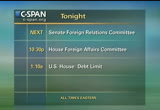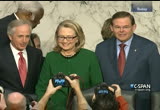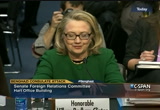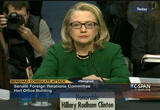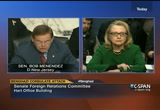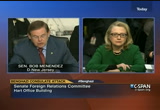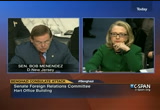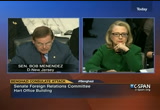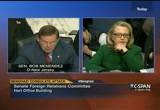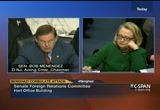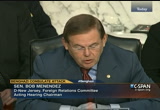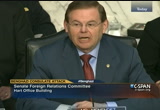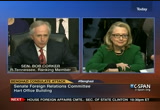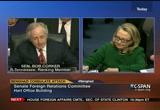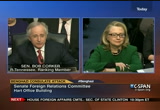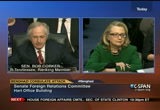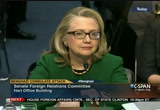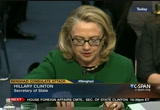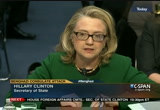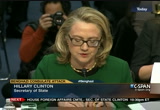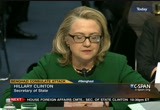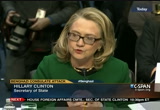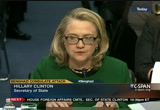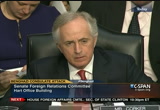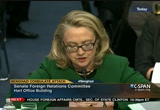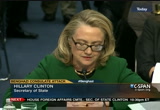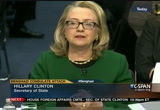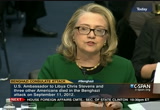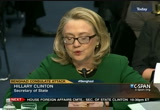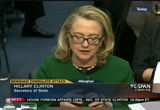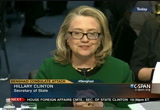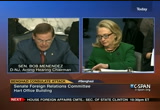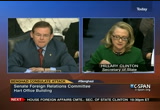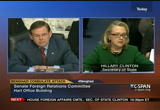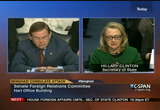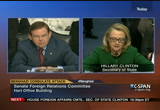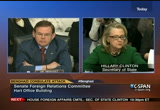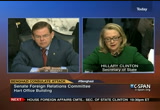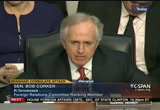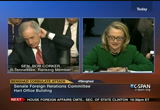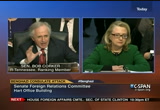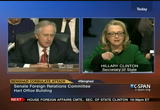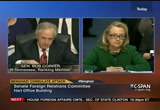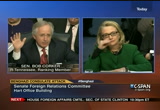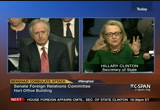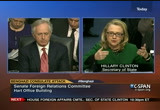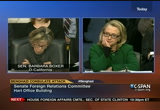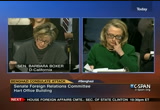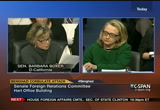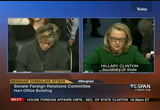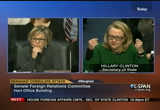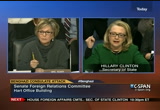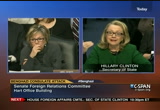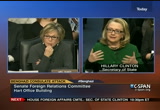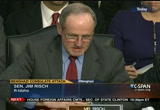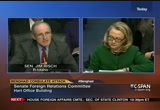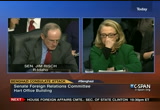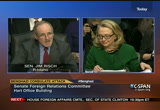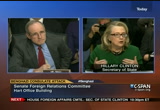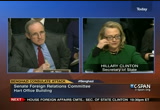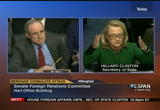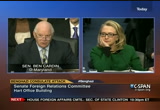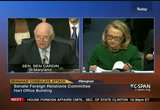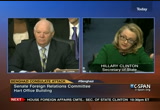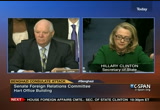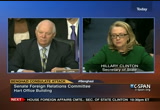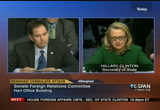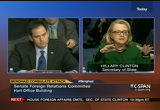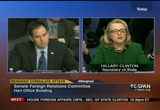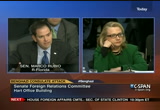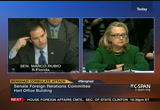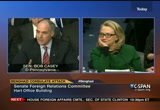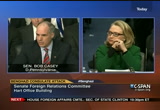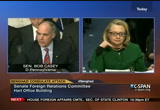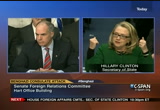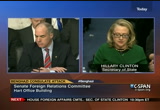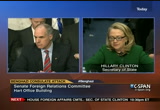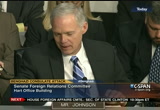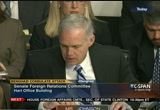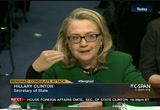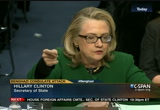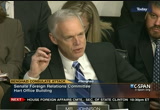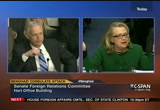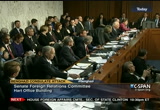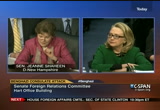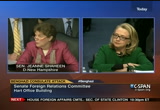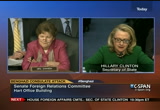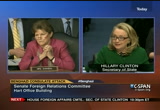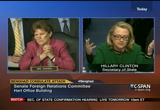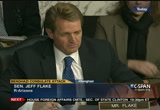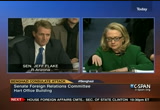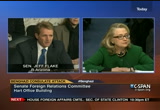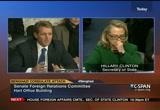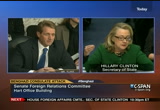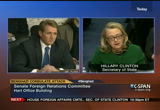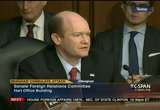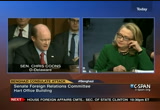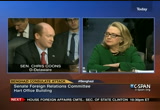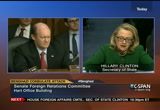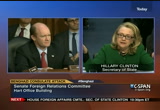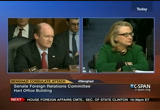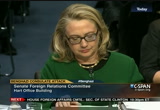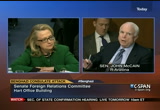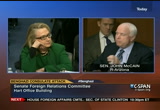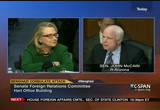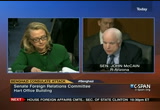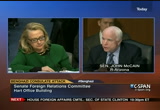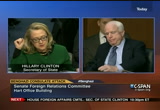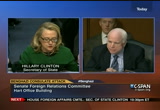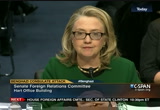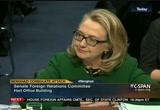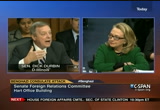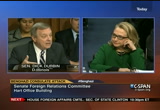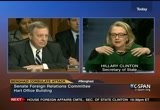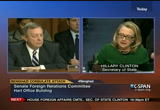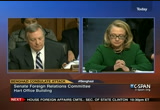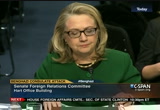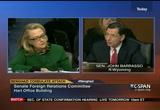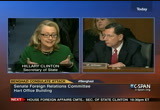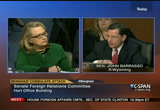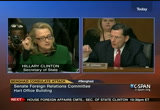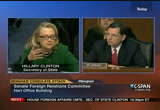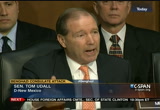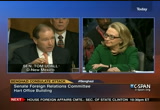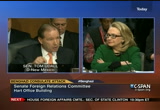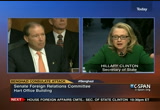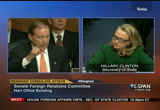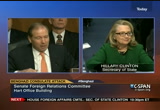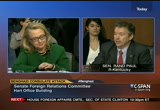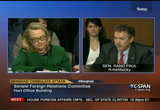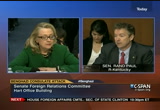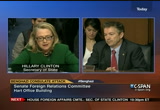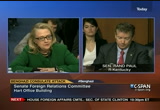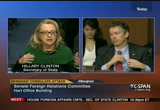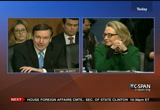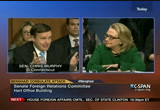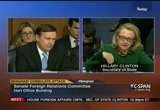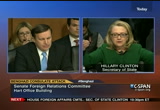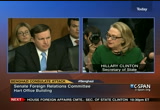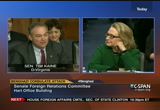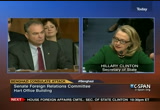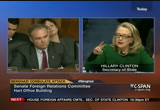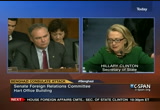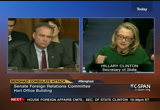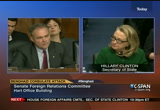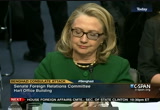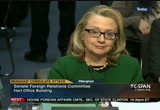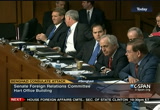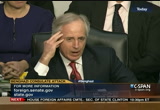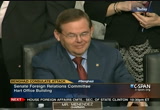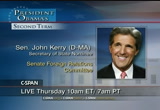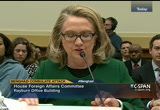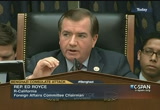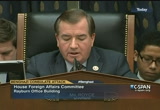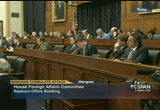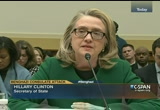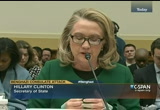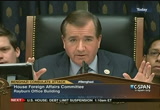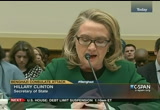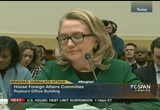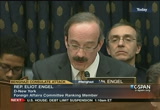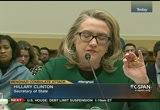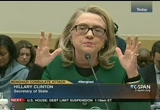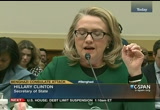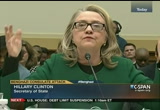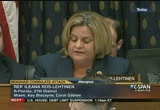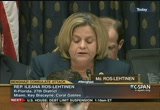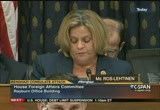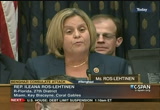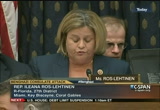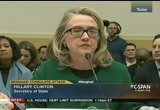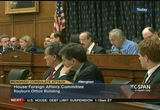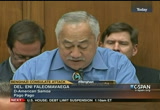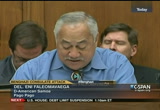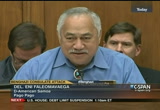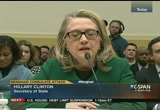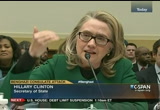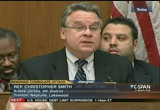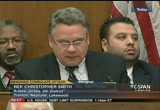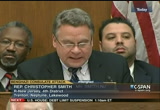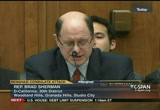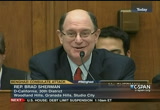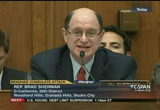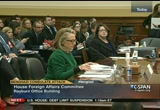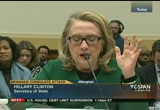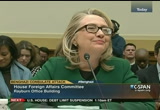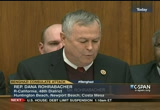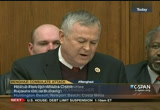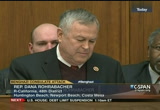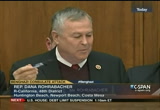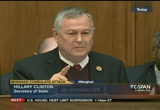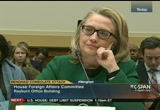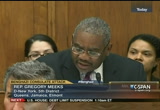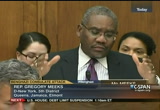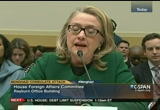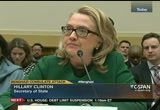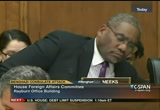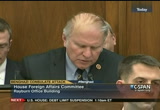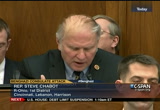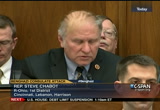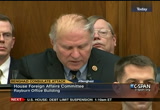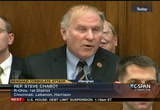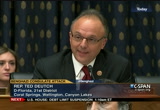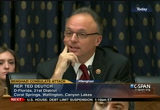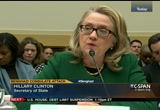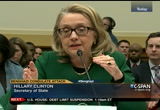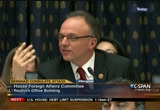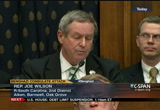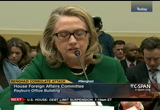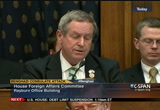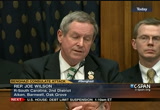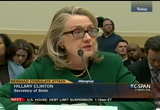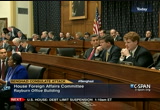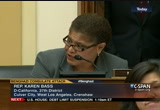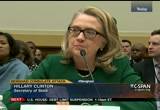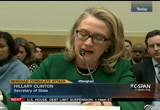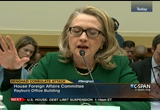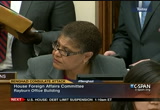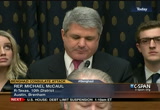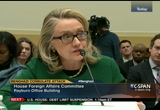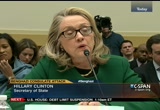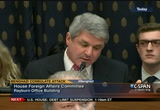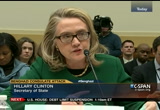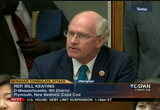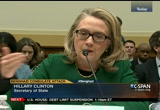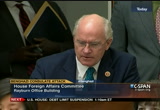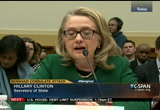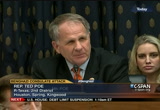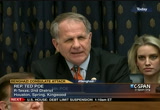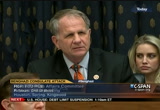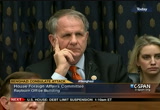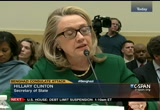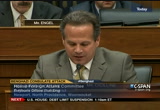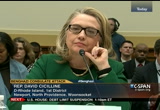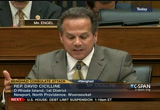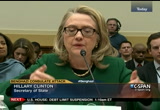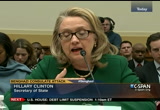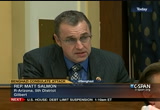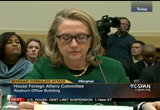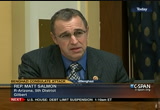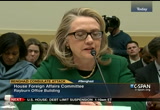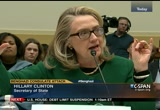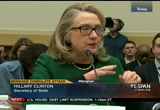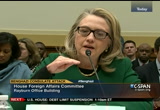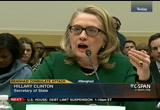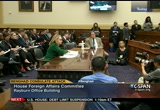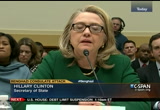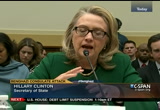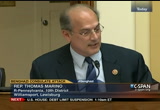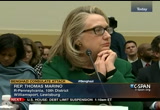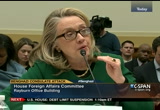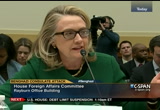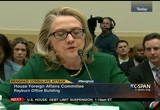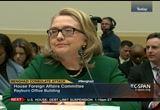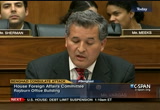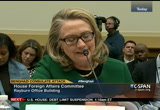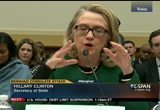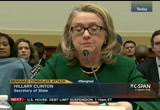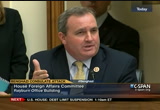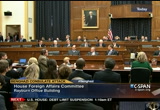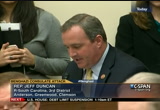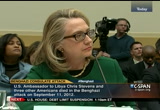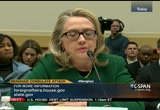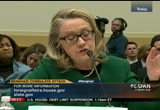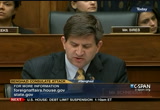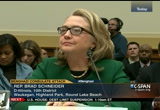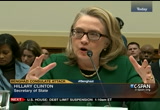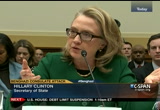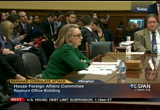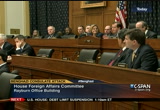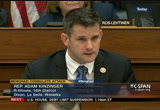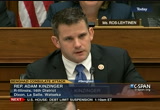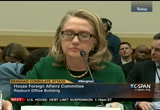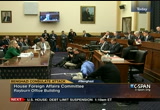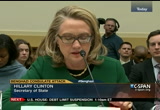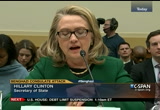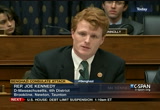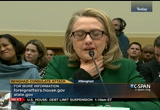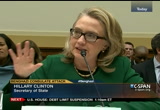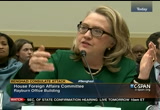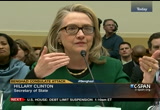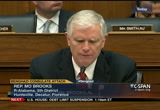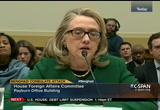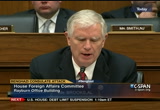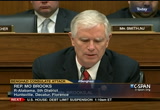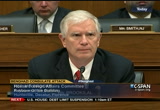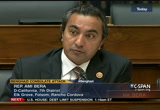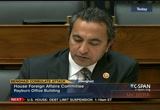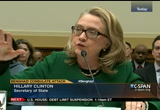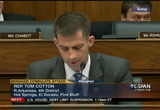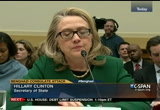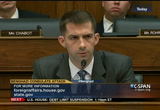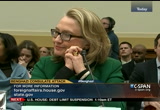tv Capitol Hill Hearings CSPAN January 23, 2013 8:00pm-12:59am EST
8:00 pm
c-span when members gavel back in. tonight on c-span, secretary of state hillary clinton faces questions about the attack on the u.s. consulate in benghazi, libya, in two congressional hearings. first the senate foreign relations committee, followed by her testimony at the house foreign affairs >> and hillary clinton answered questions about the september 11, 2012 attack. a u.s. ambassador died in that attack along with two of the embassy's security staff. secretary clinton will be stepping down from her purse once a new secretary of state is confirmed. this is two and a half hours. [captioning performed by national captioning institute]
8:01 pm
8:02 pm
since the full senate has not passed the committee resolution officially, i want to ask unanimous consent to returning members to allow prospective members to protest pay into de's hearing. if there is no objection, so ordered. let me welcome you and thank you to come before the committee. you had an intervening challenge and we are thrilled to see you here today doing well and to take time out of your schedule in these final days to discuss the tragic events that occurred in benghazi on september 11. , and the lessons we need to
8:03 pm
learn from that event to make sure all of our personnel is protected. in your tenure as secretary of state, you have always been up front, forthright, and energetic. i commend you for it. the tragic events in benghazi are a tragic reminder of the inherent risks. it _ -- they _ the very real courage of the men and women who put their lives at risk to serve these station's interests in those areas.
8:04 pm
it is a reflection of your leadership as well as your patriotism to move a world toward democracy peace and preservation of human rights. i believe every member has always welcomed your openness and cooperation. four-letter was appreciated by members on both sides as an example of that openness and cooperation. we share your commitment today. to devise policies to better protect the men and women serving in d.c. and posts around the world. ambassador chris stevens, shaun smyth, tyrone, lost their lives during terrorist attacks.
8:05 pm
we grieve with their families. we also resolved to take specific actions to prevent future incidents. we may not be able to prevent every single terrorist attack of the future, but we can and must make sure our embassies and employees are capable of withstanding such an attack. the department has embraced all 29 of the recommendations. we hear more today about the progress already made toward implementation of many of the recommendations. i would add the congress is not without responsibility. we have an obligation to do our part to comply with the administrative review board's recommendations. i intend to work with the department in the coming months on legislation that will improve security and better protect our employees.
8:06 pm
one of the easiest things we can do is ensure the contract rules allow for sufficient flexibility to allow them to quickly make decisions where security is at risk and to hire local guards on a best-value basis to ensure we are not just checking the box when it comes to protecting our people and securing the building. value should be a priority in all locations. we also look at where sole source may be appropriate to respond to certain security- related concepts. we also support expanding the marine security guard program, hiring more diplomatic security personnel and authorizing full funding for the embassy construction, capital costs program. khaki program was created in the aftermath of the 1988 bonding --
8:07 pm
bombing that resulted in 224 deaths, including a 1100 american citizens. it funded the construction of 13 new facilities in the first year, followed by a 11 in 2006. nearly every year since, fewer have been built than the previously year due to funding constraints. at the current anticipated funding rate for fiscal year 2013, we will be able to construct just three new facilities, despite the fact there are a couple dozen posts designated as high-risk, high threat posts. the lessons of benghazi are not only about addict -- adequate security operations. it is also our foreign at
8:08 pm
facilities, within the department itself, and between the department and congress. the department should be assessing and regularly designating which post is high threat or high risk. using that information to drive decisions about security. the administrative review board also made clear they were failures in benghazi that resulted in inadequacy, and the responsibility is shared by washington, and by the in exact status. it is less than clear what the security or or should be. clearly, that needs to change. there are two other crucial points made that deserve attention on a larger scale. first, the emphasis on the growing challenge faced by all
8:09 pm
american officials operating overseas, how to remain active in high threat environment. how to get out beyond the walls of our facilities. how do we remain successful in the private sector while still securing our embassies and protecting our people in these environments? the review board correctly points out the department has been resource-challenge for many years. this has constrained our mission, and restricting the use of resources even for security has become a conditioned response. decisions about the security resources being made more on costs than value. the approach fails to recognize the diplomacy and foreign aid put down payments in terms of good will, open borders for the
8:10 pm
export of american products, protection of intellectual property, and cooperation on security and counterterrorism. there is a lot to discuss. welcome again. we appreciate your time. on a personal note, since this is likely to be your last hearing before this committee and your leadership will be missed, i speak for many when i say you have been an outstanding secretary of state, you have changed the face of america abroad, and extended the house killed the bill -- hospitable retail pork -- of our organizations. during changes in asia, a momentous transition in libya, -- i personally appreciate the fact you use your office to
8:11 pm
aggressively find sections to iran. he supported those divisions -- individuals who do not live in the limelight, women, children, religious minorities, and see l d b t community -- lgbt community. i look forward to working closely with you in the future. we thank you for your service here in the senate. as secretary of state, we welcome you back any time to talk about the issues of the day, recognizing you may not care to spend all right -- more time in that chair then you already have. we appreciate your incredible service. let me turn to my friend and colleague, the new ranking member of the committee. >> thank you. thank you for your comments.
8:12 pm
and also for following through to have this hearing today. i want to welcome the new committee members. there will be time for us to talk a little bit about the committee moving forward in many ways. this is closing out business from before. i thank you very much for havin. you made some time ago . forth over the last four years. you trot -- you probably traveled more than any secretary of state in history. you can add your job with hard work and diligence.
8:13 pm
we all appreciate the transparency with which you talk to all of us. i do want to say benghazi represents a lot of different things. in some ways, the aftermath in particular of what we saw represents the very worst of washington. the most bizarre briefing i think i ever attended was on september 20, where the intelligence community said more than nothing and it was a bizarre briefing, at best. happened in the middle of a political campaign and there was a lot of spin from the white house and a lot of comments made on both sides of the aisle, which heightened a lot of the focus on benghazi. i think it also represented a
8:14 pm
department that made decisions that were not based on what was best for those in the field. i think it represented in many ways the denial of the world as it really is today. after reading viet arb, it represented a committee that has never done its work, never done the kind of oversight this committee ought to do. it also represents an awakening. i know you have known this, and especially many of the members on this committee have known this. the spiking of the ball and thinking when osama bin laden was gone, that was the end of al qaeda, we know nothing could be further from the truth. the arab spring is ushered in a time where al qaeda is on the rise. the world, in many ways, is even more dangerous as we lack a central command and instead have these notes scattered
8:15 pm
throughout north africa and other places. this creates an opportunity for us to address the world as it really is today. thirdly, i know it was a great personal loss to you that chris stephen died in the way he did and his three colleagues died the way they did. i know you have experienced this and some other members have, but look at the faces of those on the ground in libya in a state of shock, people we send there, doing expeditionary diplomacy, who felt they were on a tether and did not have the support from washington they needed, to do the things they needed to do. i think this is an opportunity for us to examine the failures. i know you will be as
8:16 pm
transparent as you have always been. this is a great opportunity for the incoming secretary to learn from what has happened. many times, political appointees have great difficulties with the bureaucracy that exists within a the department where people think they can wait you out. this is an opportunity for us to develop a foreign policy that reflects, again, the dynamics of the region as they really are today. lastly, i think this is an opportunity for the committee to finally do the work that it should have been doing for years. when you read the record and realize we have never done an authorization of the state department in the six years i have been here, we have never
8:17 pm
looked at how foreign aid has been spent. we have never done a top to bottom review. it is something people like you come to this position, look at as something that is healthy. there was mention of cost. i was disappointed with the arb when the first thing that came out of the mouths of people i respect was money, money, money. this committee would have no idea whether the appropriate amount of money is being spent or if that could have prevented what was happening -- what happened because we have never had an authorization. i want to close again by thanking you for your service, thanking you for your friendship, thanking you for your transparency, and i certainly look forward to your testimony. i know it will be presented in a way that will be constructive and helpful for us in the future. >> thank you.
8:18 pm
we welcome your remarks. >> thank you. members of the committee older and new, i am grateful for the opportunity and thank you for your pace since -- patients. as both the chairman and the ranking member have said, the terrorist attacks in benghazi in 2012 that claimed the lives of four brave americans, are part of a broader strategic challenge to the united states and our partners in north africa. i want to add context, share what we have learned, and where we can work together to not only honor our fallen colleagues, but continued to champion american
8:19 pm
values. any clear eyed examination of this matter must begin with a sobering fact. there has been a review board investigating attacks on american diplomats and their facilities. benghazi joins a long list of tragedy's for our department, other agencies, and america. our embassy in 1983,, counsel and staff murdered in 2004, the coast attack in 2009, and many others. since 1977, 65 american diplomatic personnel have been killed by terrorists. the list is even longer.
8:20 pm
we should never forget our security professionals get it right more than 99 percent of the time against difficult odds all over the world. that is why, like my predecessors, i trust them with my life. administrations of both parties and partnerships with congress have made good faith efforts to learn from these attacks. to implement recommendations from the review board, to seek the necessary resources, and do better to protect people from these threats. that is the least the men and women who served this country deserve. i have no higher priority and no greater responsibility. as i have said many times, i take responsibility and nobody is more committed to getting this right.
8:21 pm
i am determined to leave our country safer, stronger, and more secure. taking responsibility meant moving quickly in those first uncertain hours in the day to respond to crisis, but also to further protect our people in high threat areas across the world. it meant launching an independent investigation to determine exactly what happened in benghazi and recommend steps for improvement, and it meant intensifying efforts to combat terrorism and figure out effective ways. let me share some of the lessons we have learned, the steps we have taken, and what we continue to do. let's start on september 11 and those difficult early days. i have stayed in close contact with officials across our government and the libyan government. i saw firsthand what is called,
8:22 pm
timely and exceptional coordination. no delays in decision making. no denials of support from washington or our military. i want to echo the review board praise for the valor and courage of the people on the ground, especially the security professionals in benghazi and tripoli. american lives were saved in real time. the next morning, i told the american people that heavily armed militants -- i stood with president obama as he spoke about an act of terror. it is important to recall in that same time period, we were seeing violent attacks in cairo, as well as large protests outside many other posts, where thousands of our diplomats served.
8:23 pm
so i immediately ordered a review of our security posture around the world, with particular scrutiny for high- threat posts. and i asked the department of defense to join interagency security assessment teams and to dispatch hundreds of additional marine security guards. i named the first deputy assistant secretary of state for high threat posts so that missions in dangerous places get the attention they need. and we reached out to congress to help address physical vulnerabilities, including risks from fire, and to hire additional diplomatic security personnel and marine security guards. second, even as i took these steps, i quickly moved to appoint the accountability review board because i wanted them to come forward with their report before i left, because i felt the responsibility and i wanted to be sure that i was putting in motion the response to whatever they found; what was wrong, how do we fix it. i have accepted every one of their recommendations. i asked our deputy secretary for management and resources, deputy tom nides, who appeared
8:24 pm
before this committee last month, is leading a task force to ensure all 29 are implemented quickly and completely, as well as pursuing additional steps above and beyond the board. -- the recommendations. i pledged in my letter to you last month that implementation has now begun on all 29 recommendations. we've translated them into 64 specific action items. specific bureaus and offices with clear timelines for completion. fully 85 percent are on track to be completed by the end of march, with a number completed already. but we are also taking a top-to- bottom look to rethink how we make decisions on where, when and whether our people should operate in high-threat areas, and how we respond. to threats and crises. we are initiating an annual high threat post review chaired for the first time in american history, i suppose, by the secretary of state, and ongoing reviews by the deputy secretaries, to ensure that pivotal questions about security reach the highest level. and we will regularize protocols for sharing information with congress. now, in addition to the
8:25 pm
immediate action we took and the review board process, we're moving on a third front: addressing the broader strategic challenge in north africa and the wider region. benghazi did not happen in a vacuum. the arab revolutions have scrambled power dynamics and shattered security forces across the region. instability in mali has created an expanding safe haven for terrorists who look to extend their influence and plot further attacks of the kind we just saw last week in algeria. and let me offer our deepest condolences to the families ofwe remain in close touch with the government of algeria, ready to provide assistance if needed, and also seeking to gain a fuller understanding of what took place so we can work together to prevent such terrorist attacks in the future.
8:26 pm
now, concerns about terrorism and instability in north africa are not new, of course. indeed, they have been a top priority for this entire national security team. but we need to work together to accelerate a diplomatic campaign to increase pressure on al-qaida in the islamic maghreb and the other terrorist groups in the region. i've conferred with the president of libya, the foreign ministers and prime ministers of tunisia and morocco.
8:27 pm
two weeks later, after the attack, i met with a very large group of regional leaders at the un and was part of a special meeting focused on mali and the sahel. in october, i flew to algeria to discuss the fight against aqim. in november, i sent deputy secretary bill burns on an interagency group to algiers to continue that conversation. and then in my stead, he co- chaired the global counterterrorism forum that was held in abu dhabi and a meeting in tunis working not only on building new democracies but reforming security services. these are just a few of the constant diplomatic engagements that we are having focused on targeting al-qaida's syndicate of terror closing safe havens, cutting off finances, countering their extremist ideology, slowing the flow of new recruits. we continue to hunt the terrorists responsible for the attacks in benghazi and are determined to bring them to justice. and we are using our diplomatic and economic tools to support the emerging democracies, including libya, in order to give them the strength to provide a path away from extremism. but finally, the united states
8:28 pm
must continue to lead in the middle east, in north africa, and around the globe. we've come a long way in the past four years, and we cannot afford to retreat now. when america is absent, especially from unstable environments, there are consequences. extremism takes root; our interests suffer; and our security at home is threatened. that's why chris stevens went to benghazi in the first place. i asked him to go. during the beginning of the revolution against qadhafi, we needed somebody in benghazi who could begin to build bridges with the insurgents and to begin to demonstrate that america would stand against qadhafi. nobody knew the dangers or the opportunities better than chris, first during the revolution, then during the transition. a weak libyan government, marauding militias, even terrorist groups; a bomb exploded in the parking lot of his hotel.
8:29 pm
he never wavered. he never asked to come home. he never said, "let's shut it down, quit, and go somewhere else." because he understood it was critical for america to be represented in that place at that pivotal time. so mr. chairman, we do have to work harder and better to balance the risks and the opportunities. our men and women who serve overseas understand that we do accept a level of risk to represent and protect the country we love.
8:30 pm
they represent the best traditions of a bold and generous nation. they cannot work in bunkers and do their jobs. but it is our responsibility to make sure they have the resources they need to do those jobs and to do everything we can to reduce the risks they face. for me, this is not just a matter of policy. it's personal, because i've had the great honor to lead the men and women of the state department and usaid, nearly 70,000 serving here in washington and at more than 275 posts around the world. they get up and go to work every day, often in difficult and dangerous circumstances thousands of miles from home, because they believe the united states is the most extraordinary force for peace and progress the earth has ever known. and when we suffer tragedies overseas, the number of americans applying to the foreign service actually increases. that tells us everything we need to know about the kind of patriots i'm talking about. they do ask what they can do for their country, and america is stronger for it. so today, after four years in this job, traveling nearly a million miles and visiting 112 countries, my faith in our country and our future is stronger than ever. every time that blue and white airplane carrying the words "united states of america" touches down in some far-off capital, i feel again the honor it is to represent the world's indispensible nation. and i am confident that, with your help, we will continue to keep the united states safe, strong, and exceptional.
8:31 pm
and now i would be very happy to answer your questions. so i immediately ordered a review of our security postur it is critical you work together to understand and address the changes that are needed to face what our increasingly complex threats. i know you share my sense of responsibility and urgency and while we may not agree on everything, let's stay focused on what really matters -- protecting our people and the country we love. thank you for the support you personally have given to me over
8:32 pm
the last four years. i would be happy to take your questions. >> thank you. we have a full committee present. in order to give each member an opportunity to give everyone time, i will limit those to five questions. i start with myself. we saw a late night reporting on discussions of a location of the benghazi. my understanding is that the location was an ongoing one and that the ultimate conclusion of the ambassador stevens is that we need to be in the benghazi and that, while he was continuously reviewing other options, it was his conclusion, as well as that of the security personnel that the current site
8:33 pm
was the best choice, despite a higher price tag because it was more secure than returning to the hotel, where there had been a bomb and bomb threats or moving closer to the and that's because it was closer to the road. can you give us your insight on the decision making process regarding the location of the mission? can you -- you touched upon it in your ultimate the statement, but what actions were you and your staff taking that night? >> first, you are right there was an ongoing discussion. when chris first landed in benghazi, he stayed in a hotel. there were attacks in the vicinity, including in the parking lot of the hotel. the decision was to move. the compound was selected as being a much better location in
8:34 pm
terms of security than the alternative. there was an ongoing discussion between tourists and others and those going in and out of benghazi about how best to situate our post there. i saw overnight reporting about a document. i am not sure what it is. i would observe there were a lot of ongoing efforts because it was important we were constantly asking what was the best place. as you said, and chris was committed to not only being in the benghazi but to the location. the professionals in washington paid close attention to his judgment based on his experience and firsthand knowledge. we stayed and continued to try to upgrade the facility that was
8:35 pm
attacked. as has been pointed out, there were inadequacies in the response. specific kinds of recommendations we are currently implementing. regarding what i was doing on september 11, i was at the state department all day and late into the night. during most of the day, prior to of the attack, we were focused on our embassy in cairo. that was under assault by a group of protesters. we were assessing the security of our embassy, which is well- defense. d. there were crowds intent on trying to scale a wall. we were in close communication
8:36 pm
with our team. i was notified of the attack for the after 4:00 p.m. over the following hours, we were in continuous meetings and conversations in the department with our team in tripoli, in the agency, and internationally. i instructed officials to consider every option, to break down the doors of the libyan officials to get as much security support as we possibly could to coordinate with them. i spoke to the national security adviser several times. i briefed him on developments. i thought all pot -- i sought all possible support from the white house. they quickly provided it. tom was my first call. i spoke to get the situation updates. i spoke with the former cia
8:37 pm
director to confer and coordinate, given the presence of his facility, which was not well known, but was something we knew and wanted to make sure we were closely last up together. i talked with the libyan national congress president to press him on greater support. i participated and a video conference on see with -- with senior officials. we were going over every possible option, reviewing all that was elite -- available to us. any actions we could take. we were reaching out to everyone we could find to get an update about ambassador chris stevens, and also our information specialist, john smith. -- sean smith. i spoke with president obama
8:38 pm
later in the evening. him up to date, hear his perspective. we kept talking with everyone during the night, in the morning, on the 12th, i spoke with jim -- general dempsey. the two hardest calls i made to -- were obviously to the families. they were extraordinary in their responses and their understanding of the pride we had in both men. and gratitude we had for their service are. i would add, mr. chairman, that while this was going on and we were trying to understand it, get on top of it, we were continuing to face protests,
8:39 pm
demonstrations, violence across the region. there were so many protests happening and fat -- and thousands of people were putting our facilities at risk. we were certainly very determined to do whatever we could about benghazi. we were really -- relieved when we got the last americans out. >> thank you. my time is expired. >> thank you. madam secretary, i agree with you when people go in the field, they do it knowing the risk. one of the untold stories here is the heroic capture nature of what they did to save lives in libya.
8:40 pm
i also have to say there were systemic deficiencies and i know you know that. i would like to speak to that for a moment. to my knowledge, no one has been held accountable. our staff had a meeting with one of the state department officials. it was nothing short of bizarre as they talked about the communications. these officials were screaming out for more security. i am wondering if you might mention one reform that might be helpful so you would have known of the need their of security -- there of security. >> i have thought about this almost constantly since that date. i do feel responsible. i feel responsible for the nearly 70,000 people who work for the state department.
8:41 pm
i take it very seriously. the specific security request pertaining to benghazi were handled by the security professionals in the department. i did not deny them or approve them. that is one of the findings that the ambassador and the admiral made that these requests do not ordinarily come to the secretary of state. >> i respect you tremendously but we have a short amount of time. they did come into focus. we did have people on the ground at no cost to the state department. they were asked to be extended by the ambassador. someone at the state department turned that down. i just wonder what has happened inside to make sure that never happens again. >> several things. not only are we on the path to implement all of the recommendations.
8:42 pm
we have gone beyond that. we immediately did this high threat assessment using these assets as well as our own. that had never been done before. we asked congress to help us reallocate funds. the senate has given us that authority. we do not yet have it from the house. we can get more marine guards, a more security guards, put more money in the macons and the .onstruction needed care i i am recommending there be a regular process that includes the secretary and the deputies in these decisions. nobody wants to sit where i am. and have to think now what could have, should have, would have happened to avoid this. only two have ever been
8:43 pm
unclassified. the one coming out of the east african bombings, where there was full transparency, a set of recommendations, many of which have been abandoned. this committee never had a public hearing about the 17 others, because they were classified. we are putting into action steps that we think will help the next secretary be able to make these decisions, be part of these decisions, have more insight into what is going on, and we would welcome the opportunity to work closely with a subcommittee or a set of members to make sure that is what is happening. >> thank you. i will say none of them have ever been fully implemented. >> that is not accurate.
8:44 pm
i heard you say that and it shocked me. we went back and did a full and thorough investigation. the vast majority have been implemented. we will give you a report to that effect. that is the kind of information that would be shared. there is always an armed services authorization. there needs always to be a foreign relations committee authorization. >> my last question. it is my sense that as a nation, we were woefully unprepared. i think you share that. i just wonder. i know you made opening comments regarding us leading in that area. it seems to me benghazi
8:45 pm
symbolizes the woeful unpreparedness our nation had as it relates to issues in north africa. i hope you will address that as you move ahead. >> let me briefly address what i think is one of the key issues for our country. when i was here four years ago testifying for my confirmation, i do not think anybody thought gaddafi would be gone, that we would have such a revolutionary change in the region. there were hints of it. several of us said the institutions were sinking in the sand. there was some feeling out there. i do not think any of us predicted this, least of all the people in these countries who were then given the chance.
8:46 pm
this is a great opportunity as a serious threat to our country. i hope we seize the opportunity. it will not be easy. these new countries have no experience with democracy. they do not have any real experience among the leaders in running countries and doing security. we now face a spreading to hottest threat. we have driven a lot of the operatives out of afghanistan, killing. this is a global movement. we can kill leaders, but and still we help establish a strong democratic institutions, until we do a better job communicating our values and building relationships, we will be faced with this level of instability.
8:47 pm
i have a lot of thoughts about what more we can and should do given this new reality we face. >> thank you. senator kerry >> thank you. -- senator. >> thank you. you have always spoken out forcefully where required. this is maybe the last time you come before us as secretary. i want to thank you for your advocacy on behalf of women around the globe. you will be sorely missed. i hope not for too long. as you have said, you were heartbroken by those losses in benghazi. we saw your face many times today, as well. you were heartbroken personally and professionally. rather than 0.2 others for their deficiencies, you stepped up and
8:48 pm
convened an accountability to review board to look into this in detail. you asked them to tell it the way they saw it. i want to give you my take on that. i want to go to something the senator said which i agree with. the first report we got from the intelligence community a week or so after was very confusing. it was not helpful to us. all of us felt that way. i want to speak for my self. the difference between that meeting and the meeting we had with those cochairs could not have been more different. they were so impressive. they were thorough and strong. they did call it the way they saw it. i am grateful you have unequivocally committed to ensuring their recommendations are implemented to the fullest
8:49 pm
extent. this brings me to a question. as we all know, the house of representatives urged and voted for embassy security. maybe it is irrelevant for some here, but i have a message. it does cost money to pay for embassy security or police on .he beat or military personnel to me, i was not disappointed to hear the cochairs say, congress must do its part to meet this challenge and provide necessary resources to the state department to address security risks. i think it is a no-brainer. the fact we would even have a problem with this, to me, does
8:50 pm
not make sense. i hope we can work together to get the resources we need for security. that brings me to a question about working more closely with the dod. here it is. have you already engaged with dod to provide additional marines at u.s. facilities to fill the recommendation that state and dod work together to provide more capacity is at higher risk posts? before you answer that, could you address the issue right now? when you look at molly, you see a government that is weak, they do not have the best security. are we working on that post? >> thank you. you raised a lot of very important issues. i will try to be as quick as i can in responding. let me start with the budget. this is a bipartisan issue. since 2007, the department has
8:51 pm
consistently requested diplomatic security, with the exception of 2010, congress has consistently enacted last. in 2012, the department reached close to 10 percent less than requested. may not see budgets for almost 10% off, as well. i would go back to something the chairman said. consistent shortfalls have required the department to prioritize available funding out of security accounts. i will be the first to say the privatization process was at
8:52 pm
times imperfect. the funds provided were inadequate. we need to work together to overcome that. we are asking for funding for more marine security guards, for refilling the capital account so we can begin to do the kinds of upgrades and construction needed. house and senate appropriations have been briefed. we sent letters to the house and senate leadership to ask for transfer authority language. the senate was good enough to put it in the senate version of the supplemental. it did not get into the house side. we are still looking for the house to act. with respect to molly, there was a country making progress on its democracy. it suffered a military coup,
8:53 pm
which threw it into a state of instability. some groups had been in the employ of gaddafi for years. he used them as mercenaries. with his fall, they came out of libya, bringing huge amounts of weapons from the enormous storage of weapons gaddafi had that insurgence liberated, as well as others. they came into northern mali. at the same time, there was a move to establish a base in northern mali. we have been working to try to upgrade security around the northern mali, round a number of countries. algeria is the only one with any real ability to do that. most of these countries do not have the capacity to do that. we are now trying to help put together an african force so
8:54 pm
that african soldiers can be at the front of the fight. simoleons asked the french to come in. france is one of our oldest allies. we are trying to provide for them. this is going to be a very serious, ongoing threat. if you look at the size of northern mali, you look at the desert and caves, and we are in for a struggle. it is a necessary struggle. we cannot permit northern mali to become a safe haven. people say, aqim has not attacked the united states. before 9/11, 2001, we had not been attacks on our homeland since pearl harbor. you cannot say because they have not done something, they will not do it. this is a criminal enterprise.
8:55 pm
make no mistake. we have got to have a better strategy carried not only a strategy that understand making it possible for these governments to defend itself better, for people to understand and agree with us that they can bolster democracy and try to give these arab resolutions a chance to succeed. >> thank you. >> thank you for your service. thank you for the kindness you have shown the committee over the time you have been there. i appreciate you facilitating meetings for us. moving to the issues at hand, this morning, the national media is reporting that a number of the attackers in algeria are people who participated in the
8:56 pm
attack in the benghazi. can you confirm that for us? >> i cannot confirm it. i can give you the background that i was able to obtain. this information is coming from the algerian government, related to their questioning of certain terrorists they took a life. we do not have any way to confirm its as yet. i can assure you we will do everything we can to determine that. you know director mahler was in the region meeting with leaders. he is very well aware we have to track bees. this is a new threat that will be followed. >> i appreciate that. one person was captured and then released. was he one of the people who participated in the algerian attack? >> we have no information. i think you are referring to the
8:57 pm
man who appeared in a tunisian court. upon his release, i called the tunisian prime minister. two days later, the director met with the prime minister. we have been assured that he is under the monitoring of the court. he was the least -- he was released because there was not an ability for evidence to be presented yet that was capable of being presented in an open court. theyations have entered us wit are keeping an eye on him. >> thank you. you testified in your remarks. "i told the american people that our compound was a salted and i vowed to bring them to justice." i am assuming you have rock-
8:58 pm
solid evidence to make such a bold statement. >> we had four dead people and several injured once seriously. -- ones seriously. although we did not have the chance to meet with any of our attorneys, our people in tripoli receive them, got for them.cal care there was an attack, a heavily armed attack. who these people work, where they came from, that was still to come. >> there has been a lot of debate as to the context the word terror was used in. the next sunday morning, when the ambassador rice went on
8:59 pm
sunday morning talk shows, and we realized this happened at a politically charged time as we approached an election. americans are still entitled to be told the truth. did you select embassador rice? >> i did not. although i have not had a chance to testify, i have seen the resulting debate. you are right. it was a terrorist attack. what caused it? that is what we did not know. we did not know what their motives were. after months of research, it was made clear the picture remains
9:00 pm
still complicated. i say that because in the unclassified, i " key questions surrounding the identity and motivation of the prepared -- of the perpetrators remains to be determined. i recommend all staff read the classified version, which goes into greater detail. i cannot speak to its. it goes into greater detail becausebut where a variety of pl causes and triggers afford it. and there's evidence the attacks were pre coordinated and not necessarily indicative of an extensive planning. i personally was not focused on talking points. i was focused on keeping our people say. as i said, i have a very serious threat environment in yemen. we have people getting over that wall at the cairo, doing damage, until we got them out.
9:01 pm
we had a serious threat against our embassy in tunis. had to make the president of tunisian descent reinforcements, which he did -- i had to beg the president of tunisia to send reinforcements. i really do not think anybody in the administration was really focused on that so much as try to figure out what we should be doing. i wasn't involved with the the talking points process. as i understand it, it was a typical interagency process where staff, including from the state department, participated to come up with the whatever was going to be made publicly available. it was not -- it is my understanding and the intelligence community is working with the appropriate
9:02 pm
committees to explain the whole process. >> i gather you still stand by the statement he made less than 24 hours that heavily armed militants insulted our compound. the east coast and by that? >> absolutely. >> -- do you still stand by that? >> absolutely 3 >> congratulations ann thank you fee-for-service as secretary of state -- >> congratulations and thank you for your service as secretary of state. i do think it has paid off heavy dividends for the american people. i want to acknowledge your leadership. senator boxer acknowledged the gender issues yet taken
9:03 pm
international leadership on. thank you for your help in dealing with corruption, critically with transparency -- particularly with transparency. benghazi was a tragedy. the loss of american lives. we have abolished the bravery of those on the ground. they did extraordinary work -- we have also acknowledged the bravery of those on the ground. they did extraordinary work. we had a hearing on december 20 with your deputies. the provided all the information. we thank you for being here today. i want to follow up on one area of northern africa. the risk factors we have in northern africa. algeria is a reminder of the global security concerns. we do not know that -- the individuals who may have been
9:04 pm
involved in libya may have been involved in algeria. there are reports that weapons have gotten from libya into algeria. which points out our need as we look at transitions occurring in that region, syria, assad will not be there much longer we think. there are a lot of weapons in syria. do we have a strategy to make sure that their weapons are -- we are mindful these weapons could end up harming u.s. interests. it needs to be part of our strategy to make sure we support alternative governments. that there is a strong party protecting the source of these weapons not ending up harming americans or our interest. >> you are right. one of the reasons we and other
9:05 pm
government agencies or present in benghazi is exactly that. the had an effort to track down -- we had an effort to track down and recover as many dangerous weapons as possible. libya was a wash in weapons before the revolution. obviously there were additional weapons introduced. the vast majority came out of .adhafi's warehouses they went on the black market, were seized by militias and other groups and have made their way out of libya into other countries in the region and to syria, we believe. this a red line for administration with respect to
9:06 pm
syria concerning the use of chemical weapons. syria, in addition to having the fourth largest army before this revolution, has a very significant supply of chemical and biological weapons. given the instability in syria right now, what we are trying to do is courtney closely with a number of like-minded nations -- coordinate closely with a number of like-minded nations to be able to work to try to prevent those from falling into the wrong hands. also to try to work with the internal opposition for them to understand the dangers that are posed. of weaponsa's box coming out of the countries in the middle east and north africa is the source of one of our
9:07 pm
biggest threats. there is no doubt the algerian terrorist had weapons from libya. there is no doubt the malian remnants of aqim have weapons from libya. we have to do a much better job. the final thing i would say is -- i think a lot of people at the time wondered why would we have another command in the world and why in africa. i think we need to pay much more attention to its capacity inside africa. it is based in germany. carter ham has been a dedicated leader of after con -- afrikan during his time there. we will see more demands. i think that is something else the senate and house will have to address. >> thank you. >> senator rubio. >> thank you.
9:08 pm
madam secretary, we all wish this never happened but we're glad to see you here and wish you all the best. i want to share sentiment among other colleagues with tremendous respect for the hard work and service to put in on behalf of our country. one of the things i most interest and in exploring is how affirmation follows in the state department and looking forward to how we can prevent some of this happening. werewer you ever -- were you ever asked to participate in an internal meeting before this attack with regards to this -- deteriorated situation in libya? >> i appreciate your kind words. as i have said, with specific security requests, they did not
9:09 pm
come to me. with regard to the situation in libya, across libya, there were a number of conversations. and meetings to see what we could do while libya went through this transition from transitional government to interim government to elections to help them with security. critz was clear that was going to be one of their highest need -- it was clear that was going to be one of their highest needs. i went to libya in october 2011. i spoke with the then leadership and met with them. we sent teams out, civilian and military experts to try to help them. until recently while they were going through their transition, it was a very typical conversation because they did not have the authority they thought. now we are beginning and a half
9:10 pm
a long list of ways we are trying to help improve security in libya. >> the october 2011 meeting, did this issue come up with regard to the inability of the libyan government to protect our diplomatic institutions? >> we obviously talked at great -- a great deal about the deteriorating threat environment in libya. one of the reasons we had our own people on the ground and by the world looking to try to figure out how to better protect benghazi and have understandings with those in the annex is because it is the host country responsibility but they were not in a position to do what we would expect from an organized country. but they did have the militias. the february 17 brigade have proven to be responsive in the
9:11 pm
past prior to 9/11. other militias in tripoli proved to be responsive. when i landed in tripoli, i was met by a militia. that was the welcome i have. all of these guys dressed in black, holding their automatic weapons. we knew we were piecing together what a host nation was not yet able to do. >> then there was another meeting in march 2012. i believe that was here with the prime minister. was there a specific conversation between you and them with regards to concerns we had, not just the deteriorating security situation but the inability of them as a health country to meet their obligations to provide security? >> of course. this was a constant conversation. what i thought with the libyans was a willingness -- found with
9:12 pm
the libyans was willingness but not capacity. in tunisia, they had capacity but i have to call and tell them we have to get at capacity out there. they were still trying to figure out how to be a state without being a security state. but cairo, we had to call the egyptians and tell them get their people out there. the libyans were very responsive. very willing but no levers to pull it what we have been trying to do, we need your help to help us pay for what we are trying to do. we are trying to help on builds a decent security force. trying to rein in the militia as best they can. >> before the attack in benghazi, what have we done to help them build their security? >> there is a long list. i am happy to provide that to you. it is still -- filled with training, equipment, with the
9:13 pm
kind of planning and had not done before. i would be happy to send you the detail on that, senator. >> senator casey. rex madam secretary, thank you for being here today. i will ask a question that relates to the implementation of the review board recommendations. before that, i want to express a widely shared sentiment today. both by way of gratitude in commendation for your work. we do not have time today to do a full listing of all the achievements he should get credit for. the terribly difficult challenge dealing with and reducing the flow of calcium ammonium nitrate from pakistan
9:14 pm
into afghanistan which finds its way into the roadside bombs that kill our troops, known as ied's. thank you for the work. the work on behalf of women throughout the world but also women and girls particularly in afghanistan and even though we are still in the throes of responding to the challenges in syria, the great work you have done on humanitarian assistance and other elements of that strategy we have worked together on. i also want to commend the words he spoke today about not retreating when it comes to getting that balance right queen engagement and also security. both high priorities. i was struck by and i am glad you were so is this a bit on page 3 of your testimony about
9:15 pm
-- you were so pacific on page 3 of your testimony. the recommendation by the board which now has found its way into the jake now is a set of 64 specific action items. you said 85% are on track to be completed by the end of march. what if any impediments and implementation do you perceive right now and are there impediments to meeting those deadlines that this committee and congress can help you with? >> thank you, senator. thank you for those three topics covered. particularly your very clear focus on the ied problem and the
9:16 pm
ammonium nitrate problem in pakistan. i have gone there and carried that message and i thank you for making it an issue. let me say that we need your help to hold us accountable. to keep asking her to ever sit in this chair or anybody else in the department with any responsibility in this area, what are you doing and how are you doing it? it will help to clear up misconceptions. deval also help to keep driving the change. -- it will also help to keep driving the change. i believe and authorization process will dramatically changed the dynamic. i urge it be tried. we had subcommittees', we took
9:17 pm
it very seriously. we held hearings and brought people in. we had a three day marked up. we also had a quadrennial defense review. where the defense department submitted that and has helped to provide a framework. when i got to the state department, i said there is nothing like that. i started the first ever quadrennial development review. you can help me continue that and make the department have to ask the hard questions. you can help by making sure that the need to become to you with like what are the training needs, the budgetary meeks, a bureaucratic changes needed -- the budgetary needs, and bureaucratic changes needed.
9:18 pm
getting that transfer authority. if you can help us with the house. it is one but $4 billion -- it is $1.3 billion. marines do not do personal security. we are working to what the guards will do and how we can and use more of them. and more diplomatic security personnel. $130 million. then facility construction and up rates. we are going to have periodic reviews by these teams are started. we are going to start a high threat review by the secretary . will strengthen the mutual security agreements between the state apartments and other government agencies when they
9:19 pm
are not co-located. we had a good relationship with the antics in benghazi -- with the annex in benghazi. it was on the ground working together, not part of an overall template. there is a lot we can take on this. i told a admiral mollen, put it out there. i want to know more than anybody what happened. do not hold any punches. tell us what the facts are. now we have to act on it or for shame on us. >> thank you. i would like to join my colleagues in thanking you for your service. glad you are looking in good health. were you fully aware in real time of the 20 incidents
9:20 pm
reported? >> i was aware of the ones brought to my attention. they were part of our ongoing discussion about the deteriorating threat environment in eastern libya. we were very conscious of them. i was assured by our security professionals that repairs were under way. additional security upgrades had taken place. >> the do you see the cable -- did you see the cable asking for reinforcements for the security detail that would be evacuating in august? >> no, sir. >> okay. when you read the document, it strikes me as -- how certain the people were.
9:21 pm
when was the first time he spoke to or had ever spoken to the evacuees? >> i have spoken to one of them could i waited until after they had done their investigation because i did not want there to be anybody raising and the issues. -- raising any issues. >> how many were a factor when it from libya? >> the numbers are hard to pin down the approximately 25-30. >> did anybody in the state department talk to those people shortly afterwards? let there was discussion going on -- there was discussion going on afterwards. the fbi spoke to them before we spoke to them. other than our people in tripoli -- i think you're talking about washington, right? >> the point i am making is a simple phone call would
9:22 pm
ascertained immediately that there was no protest. this attack started at 9:40 pm benghazi time. it was an assault. i'm going back to ambassador rice five days later purposely misleading the american public. why wasn't that known? transparent?e >> i would say once the assault happened and what he got our people rescued and out, our most immediate concern was taken care of their injuries. i still have a ds agent at walter reed seriously injured. getting them into frankfurt, ramstein, to get taken care of. the fbi going over -- we did not think it was a puppet for us to talk to them before the fbi
9:23 pm
conducted their interviews. i think this is accurate -- i certainly did not know of any report that contradicted the ic talking points at the time that ambassador rice went on the tv shows. i just want to say that people have accused ambassador rice and the administration of misleading americans. i can say trying to be in the middle of this and understanding what was going on, nothing could be further from the truth. the information developing, but we reach conclusions later that were not reached initially -->> do you disagree that a simple phone call to those evacuees which have ascertained immediately that there was no protest? that was a piece of information that could that and easily obtained. within hours, if not
9:24 pm
days. >> when you are in these positions, the last thing you want to do is interfere with any other process. number two, no, it's a fact. i would recommend highly you read both what the arc said and the classified arb. even today, there are questions being raised. we arno -- have no doubt they were terrorists, they killed our people. but what was going on is still -- >> no, no, we were lead. there were supposedly is protests and an assault came out of that. the american people could have known that within days. >> with all respect, the fact is we have four dead americans because of a protest or guys out for a walk one night who decided to go kills americans. what different at this point
9:25 pm
does it make? it's our job to figure out what happened and everything we can prevent it from ever happening again. honestly, i will do my best to answer your questions about this but the fact is that people were trying in real time to get to the best information. the ic has a process to explain how these talking points came out. to be clear, it is from my perspective less important today looking backwards as to why these militants decided they did it then to find them and bring them to justice and then maybe we will figure out what was going on in the meantime. >> thank you. >> thank you very much, secretary clinton. i want to thank you for your leadership on benghazi.
9:26 pm
for taking responsibility for what happened there, for initiating an investigation so we would understand what happened. for moving forward to address other high risk areas and for all of your efforts to implement the recommendations of the accountability review board report. that is the kind of leadership we want to see across our government. i want to go back to what i thought you said about still looking for the funding to be transferred, the $1.4 billion from the account to address the security threats not just in libya but around thedo .orldaround world we still have not had the money transferred? that means the $130 million, the $691 million chris security
9:27 pm
installations, that is all on hold? >> now we have to start over because it was in the senate version of sandy it was not put into the house version house -- house version of sandy. >> i would recommend this action we need to get moving on immediately. because we still have people at risk of around the world. we need to take the action that will ensure their security. i would urge the chairman and the ranking member to move the committee to do everything we can to make this happen. i want to go back to something
9:28 pm
said at a hearing on december 20. i asked about the cooperation between the department of defense and state. what the situation was on the ground before the benghazi in terms of the placement of our military in the region, he talked about the unprecedented cooperation between state and defense in response to benghazi. i wonder if you could talk about how we ensure this is a standard way of doing business and that we are acting in cooperation when looking at the threats facing us, particularly as we look at what is happening in north africa. >> that is a really important and timely question. our cooperation around this crisis was exemplary. the president called the secretary and the chairman to do
9:29 pm
everything they possibly could, to spare no effort or resources. we had a very good interagency response. the fact is we have to look closely now at what more state and dod can do together to prepare for contingencies like this. it is a challenge that need to be taken up because iraq and now afghanistan, our diplomats and our military work closely together. but as we saw in iraq, that was putting a lot of burdens on our civilians in iraq that are difficult for us to be able to address. we of the light of our dod -- we colleaguesur dod for so much. what kind of civilian presence will we leave there and what can
9:30 pm
dodo to help us determine what that should be? i think you get a sense of the challenge of this from a statement that admiral mullin made -- mullen made. they looped in the military right away. the interagency response was a profit. but there was simply not enough time for u.s. military forces to admit it difference. having said that, it is not reasonable nor feasible to tell other u.s. forces at the ready to respond to protect every high risk post in the world. so we have to look at this from both the state department and dod perspective. we do not have access of any significance right now on the african continent. we are only building that up. and what do we need in africa, and what countries will welcome
9:31 pm
as their, and give us our military and civilian teams a state based out of which to operate? if we are focusing just on africa out, particularly in north africa, there have to be a great deal of planning and coordination between dod and between the state department and the rest of the administration. >> thank you have, madam secretary, for your testimony and for your service. traveling over 1 million miles and what the 100 countries. those of us who have not done it had cannot appreciate how difficult that is and the commitment you have had to it over the years. with regards to the appearance of dr. rice on the morning shows, you mentioned that you did not select her. we consulted in that decision? >> no.
9:32 pm
it would not be unusual for embassador right to represent the administration on foreign relations issue. -- for ambassador rice to represent the administration on foreign relations issues. >> it was clear what she testified to was -- a lot of the information that had been gathered. can you tell us about discussions that went on at the state department after that testimony? these are professionals that you oversee who do a lot of hard work to give analysis. what she said was clearly at variance with a lot of the research and analysis that have gone on about the nature of these attacks. can you just speak to the
9:33 pm
discussions that were had at the state department after the testimony? >> i cannot speak to any conversation i specifically had because the conversations were ongoing before and after ambassador rice's appearance on the sunday talk show. we did not conclude finally that there were no protests at all until days after the attack. maybe it was an abundance of caution, maybe it would try to make sure we did not step on anybody's toes while we were gathering information. maybe it was because the ic was still looking at their sources and having different threats coming in. as the arb said, even today, the motivations, the actions before they went on to the compound, all of that is still not nailed down. we were trying very hard to
9:34 pm
provide information. maybe one of the lessons learned is just withhold three do not say what you do not know for sure but that is not part of who we are as americans and public officials. we get out there and say here is what we think happened, it is subject to change. i think we all wish that nobody had ever in any way raised doubts but ambassador rice was speaking of what had been determined where the most acceptable talking points. >> i think we know now the talking points, we do not and we did know where or how the word change. but they were altered. we are not giving a clear picture -- were not given a clear picture of what went on. >> but senator, you know, we did
9:35 pm
not have a clear picture. i wish i could tell you that within a week, by september 20 women came up here, we had it -- a clear picture. if you wish to fault the administration, we probably did not do as clear a job explaining that we did not have a clear picture until days later, creating what i think are legitimate questions. i had been on the other side of the table. i understand trying to figure out what was going on and why we were told this, that, and the other. i can only assure you that as the information came to light, we shared it. but that took some time. >> thank you. you mention many of the recommendations that have now put -- are not put in place are particles -- are protocols.
9:36 pm
there were protocols in place before this. there were trip wires. the actions that were outlined to be taken were not taken. how can we be assured here that the new protocols that are and the place will be followed -- that are in place will be followed? >> i want to make clear that no one in the department, the intelligence community, any other agency, ever recommended that a close benghazi. we were clear eyed about the threats and dangers as they were developing in eastern libya and in benghazi. but there was no decision made and nothing that profits such a decision.
9:37 pm
sitting here today, we have probably 20 other posts that are under a serious threat environment as i speak to you. we are working with the other agencies in our government. we are constantly assessing. a nd sometimes we get it wrong. it is rare that we get it wrong. this was one of those terrible tragic times when there was an assessment shared by the ambassador, shared by others, that turned out not to take into account the militants attacking that night. so i can tell you there are as you say tripwires but what we will try to do is elevate the discussion and decision making so that there is not any doubt
9:38 pm
that everybody is on the same page. that we are not missing information or making less than optimal decisions. that is what we will try to institutionalize going forward. >> thank you. i want to thank senator menendez for chairing this hearing and secretary clinton for testifying. we regert you were unable to appear before because of your illness and i am thrilled to see you have made it will recover. for your thank yolu remarkable work. we shared a joint stock -- stop in liberia to celebrate the presidency of ellen sirleaf johnson. in my view, your leadership has helped restore america's credibility.
9:39 pm
he had also built bridges here on the hill -- you have also built bridges here on the hill. you will be deeply missed. he said in your opening statement you are determined to leave our country safer, a more secure. in my view because of your leadership, they are. the review board found security was grossly inadequate to deal with the attack that took place in benghazi. the mistakes that were made are unacceptable and i am pleased as the department will document recommendations -- recommendations. i look forward to working with my colleagues on this committee in a review of the resources needed and the state department
9:40 pm
structure to ensure that we do better to protect our diplomats and other americans who put their lives at risk every day. as chairman of the africa subcommittee, i am pleased you have drawn for us today billings ks.ween -- the linjk i chaired a heaing in mali on -- hearing in mali and i have been impressed with your engaged leadership. i welcome your testimony today on how you see the regional rolets from aqim and what you think there is for the united split -- united states supported the current actions by the french and malian military. and how to restore democracy in mali and how you think we can
9:41 pm
insure that state and defense are coordinated in west and north africa going forward pierre >> i appreciate greatly sustained attention to africa. i think it is going to be viewed as quite prophetic. there will be a continuing set of challenges. you mentioned some of them. but by no means, we have boca haram in nigeria posing the threat of instability to one of the most important producing oil producing naissance in the world -- one of the most importan oil producing nations in the world. we also have a success story. in somali. what did the united states do
9:42 pm
there? when i became secretary of state, i recommitted american money to the forces. the report to train the ugandas and burundis and others. we worked with the djiboutis. it took time. we had the boots of our american soldiers and diplomats on the ground. i visited one of the training camps in uganda and what we have indo is recognize we are for a long-term struggle here. that means we have to pay attention to places that historically we have not chosen to or had to. i would hope this committee can make that case to the rest of congress. we are now looking at troops coming from other neighboring african countries. we can't just send them into
9:43 pm
mali. doey don't have training to that. we will have to work with other partners to train and equip them and sustain them, just like we did with troops in somalia. we have a chance to really continue on a positive track their but it did not happen by accident it took american money, american experience. we have to make the decision we will do the same in north africa as well. >> thank you. i look forward to getting your debt -- you're a device and encouragement to ensure the same success going forward in west africa. >> senator mccain. >> thank you, madam secretary. it is wonderful to see you in good health and as combative as ever. [laughter]
9:44 pm
we thank you for your outstanding and dedicated service to this nation. we are proud of you. all over the world when i travel, you are viewed with admiration and respect. months after the benghazi tragedy, there are many questions that are unanswered. the answers frankly that you have given this morning are not satisfactory to me. were you and the president made aware of a classified cable from chris stevens that said united states consulate in benghazi cannot survive and the stained assault, numerous warnings about the security were unanswered or unaddressed. it took a cnn reporter looking through the conflict to find chris stevens last warning.
9:45 pm
when were you made aware of that table? when we you made aware of that attack on the british ambassador and the assassination attempts? and what actions were taken? what was the president's activities during that seven hours period. on the anniversary of 9/11, we did not have forces available hours.seven availab two americans dies in the last two hours. i reject your answer to senator johnson about how we did not ask him these survivors who were flown to ramstein the next day that they -- that this caused
9:46 pm
not a spontaneous demonstration. to say it was because an investigation was going on. the american people deserve to know answers. they do not deserve false answers. the answers that we are giving the american people on december 15 by the ambassador of united nations were false. contradicted by the classified information which was kept out of the secretary of the united nations report. who by the way had nothing benghazi to do with, which questions why she was set out to start with. why isn't the administration still refuses to provide the e- mails regarding the references to al qaeda and terrorism in the talking points? if classified information had been included, it gives an entirely different version of events to the american people.
9:47 pm
to tell them what happened, you ought to have your facts straight. here we are, four months later, and we still don't have the basic information. if you want to tell the american people what happened, you should have to at least interviewed the people who were there instead of saying we could not talk to them because of an fbi investigation. as i said at the time, i happened to be one o -- on one of those talk shows. people don't bring rpgs to spontaneous .
9:48 pm
on the view, were still doing an investigation. the president to as late as september 2014 did not acknowledge this was an act of terror. conducted by people who were at least somehow connected to al qaeda. i strongly disagree with your depiction of what we did after gadhafi fell. we did not provide the security that was needed. we did not help them with border security. we did not give them the kind of assistance that would have a necessary to help dismantle these militias that still remain at challenge to democracy in. in you knew chris stevens very
9:49 pm
well. i knew him very well. on july 7th, he expressed to me his deep concerns about security in benghazi. he continued to communicate with his state department -- with the state department of his deep concern for security and the need for additional systems. i will argue with facts that after that event took place, the "soft footprint" was to some degree responsible for the tragedy that took place. the american people and the families of these four brave americans have not gotten the answers day deserve. i hope they will get them. >> senator, i understand your
9:50 pm
strong feelings. you knew chris and were a friend of his and a supporter of the efforts to dislodge gadhafi and try to get the libyan people a chance. we just have a disagreement. we have a disagreement about what did happen and when it happened with respect to explaining the sequence of events. we did get to talk to the ds agents when they got back to this country. we did so. it was not before september 15. we have no access to the surveillance cameras for weeks would help answer a number of questions. with respect to helping the libyans, we will provide a list of everything we were doing and were attempting to do. i will also tell you that since
9:51 pm
march 2011, congressional holds have been placed on programs for many months for aid to libya. we have had frequent congressional complaints. why are we doing anything for libya, it is a wealthy country, it has oil. disagreements that we should never have been part of any un mission in libya. currently the house has holds on a bilateral security assistance on other kinds of support for any terrorism assistance. we have to get our act together between the administration and congress. it is is a priority and if we are serious about trying to help this government stand up and deal with what is a very dangerous environment from east to west, then we have to work together. i hope that we can have the kind of discussion where we can agree
9:52 pm
on certain approaches that will make a difference. i would urge that you look and read both the classified and unclassified versions of the arb that tries to deal with the very questions you are raising. the timing of it and the like. i also hope we are looking forward. right now libya is still dangerous. it is still in an unstable status and what ever we can do for them, we should agree to what we need to do is get out there and start delivering. >> thank you. >> madam secretary, of what to honor our commitment to try to keep you within a certain time frame. i also want to honor the opportunity for every member to ask a question. i appreciate your thorough and thoughtful answers. senator durbin. rex madam secretary, thank you
9:53 pm
for being here. four years ago, in number of your colleagues encouraged you to take on this responsibility. believing he would have a profound impact on the world -- you would have a profound impact on the world and you have. thank you. i also want to say word on behalf of ambassador rice, an extraordinary individual. u.s. serve this country well. some of the criticism heaped on her was unfair and the not reflect the fact she was reporting the best information she had available at the time. as you have said, more information became davis -- available and it was reported. i do want to make a point about whether the american people are told everything right way in the right way so they can be fully informed. i would like to refer to five
9:54 pm
words for them to reflect on -- iraqui weapons of mass destruction. we were told by every level of government here there were iraqi weapons of mass destruction to testify in a war. we're still searching for those weapons. they did not exist. thousands of americans lost their lives. we could have a hearing on that, if you like. the point i'm trying to get to is two talented individuals, at royal mullen and -- admiral mullen and the = embassador -- the ambasassdor did it for review. you not only initiative that review but accepted its findings. no cover up.
9:55 pm
to make sure a tragedy like this never occurs again. some on the committee have criticized the notion that this is about money. they might argue you cannot solve a problem by throwing money at it. madam secretary, you cannot throw a -- money at it unless the problem is lack of money. you have passed this congress for the authority to transfer existing funds -- asked this congress for the authority to transfer existing funds and you have been refused by the house of representatives. they will not give the authority to take existing funds. if i am not mistaken, in a few weeks, your department will face sequestration. we not only will not have additional funds, we will cut some $50 million when it comes to construction of facilities to protect people who represent the united states overseas.
9:56 pm
and cut money for the individuals necessary to protect those same diplomat treat i would like you to comment, how can we keep our commitment to the area of diplomacy to avoid the necessity of war if we deny to the most basic resources to your department which commands 1.5% of the federal budget? >> actually it is less than one but let's not quibble. and there are deficiencies and inadequacies in the department -- i am well aware there are deficiencies and inadequacies in the department. to do as much as they could with
9:57 pm
what ever they have. we were never going to reach parity with the defense department. but at the same time, we have asked for the funds we think we need to fulfill the mission you have described. we need the help of this committee. i believe we have to both walk and chew gum at the same time. we have to deal with our own economy and our fiscal situation. that is a given. that is the source of our strength and capacity. we also have to be smart about making the right investments in diplomacy and development to try to solve problems and prevent them. i have outlined what should be a no brainer.
9:58 pm
let us have the permission to take money we already have. at then let's look budget as we move forward. sequestration will very damaging to the state department and usaid if it does come to pass. are there programs we could reduce, make more efficient, yes, that's part of what i have been trying to do. but there are also a lot of incentive programs to security of our personnel in dangerous places that we cannot afford to cut more of. i hope we have a sensible discussion but it going for -- budget discussion going forward. >> madam secretary, thank you figure commitment to this
9:59 pm
country -- for your commitment to this country. i have seen the work yourself to exhaustion, not for your own benefit but for the benefit of the people of this country and we are grateful for that. i agree we need to make sure something like this never happens again. i have looked at it like the challenger explosion where we lost those seven astronauts. we did not see it coming but we could and should have seen it coming. you said you never saw the security requests. the concern is we should have been seen in these sorts of things. and there were the attacks on the red cross, on the conflict itself, yet we have no evacuation plan established in spite of the fact that months
10:00 pm
earlier, we had to get an italian ferry vote to get people out who work in danger to diplomats at the time. -- who were in danger who were diplomats at the time. was best available at the time. the american people heard we have a substantial security presence. we obviously have a strong security presence. they heard obviously there was a significant security presence. i believe that was not the case. i would ask you today if you believe we had a significant and substantial and strong presence in libya at that time. we want that for all our ambassadors. >> right. security we havd a
10:01 pm
presence that was mutually reinforced with t. we have had previous incidents, not only against our compound, but against the british, red cross, and others, and what we have accepted is that even though there was a back and forth in the discussions, do you need three or five, we had five, but it was an attack that truly was not expected even though that night we had the requisite number of agents. we could get mired in the back
10:02 pm
and forth, but i believe we would be doing more to prevent future tragedies and the tax if we take -- attacks if we take the recommendation . they just wanted to look at the facts, which they did an excellent job doing, and tell us what we need to do. >> thinking about future attacks and trying to prevent those, on september 12, the president vowed to bring to justice the killers who attacked our people in benghazi. we ask the question and the senator talk about the people perpetrating the recent attacks in algeria, were they emboldened because no one has yet paid the penalty for our facility in benghazi? >> i know the fbi has been
10:03 pm
briefing some committees, i assume members of staff in this committee are included. , about the progress of their investigation. i got the update from the director a few days ago when he returned from south africa. they are following some very promising leads and putting together cases. they would have to speak to you directly about that in a classified setting. i think what they are trying to determine is how best to respond. what the president clearly said is we will respond. we will bring those to justice. i do not think anybody should doubt this president at his word. we have some very good examples. they take time, but he does not, in any way, divert attention from the goal of bringing them to justice. >> thank you. the president also said al qaeda
10:04 pm
has been decimated. in light of the recent terrorist activities we continue to see fog around the world, would you characterize that as al qaeda has been decimated? >> core al qaeda certainly has been. you would hear the same from the intelligence community for dod. the work that has been done in afghanistan and the border area is certainly has -- areas certainly havs. the people who have migrated back to other parts of the world, where they came from, primarily, who are affiliate's. part of the jihadis syndicate. some of them use different names. the fact is they are terrorists, extremists, they have designs on overthrowing existing
10:05 pm
governments, of controlling territory. although there has been the decimated -- decimation of coeur al qaeda within the afghanistan region, we do have to contend with the one of these -- the one be's.e -- the wanna be' >> thank you for being here. it is great to see you today. you have been a real and dedicated public servant to this country. your travels around the world, as many here have talked about, the million miles you have put on and all the countries you visited, i think you have been where they doeries not have a secretary of state.
10:06 pm
i have seen the difference to have you on the ground. i know it takes a toll. you are incredibly dedicated to that. it is great to see you here in good health, smiling, and engaging with all of us. i want to add to the list, senators going down the line talked about some of your accomplishments. i know previously, i talked to you about one of your initiatives. it is once again an example of picking something where people around the world who are living on a dollar or two a day, if you put in a technology like an updated cookstove, you make a big difference on their health and health of their children and the environment. i would add that to the list given here today of a very
10:07 pm
thoughtful policy making on your part. one of the findings the board made in its report, and i am quoting, the total elimination of risks is a nonstarter for u.s. diplomacy, given the need for the u.s. government to be present in places where stability and security are often most profoundly lacking and host government support is some sime -- sometime minims minimal. this underscores the difficulty in finding the right balance between engagement and security. i fully support, as you have asked here, and you have made the point the idea that we should reprogram this $1.40 billion, get our act together and respond to allegations. my question here revolves around the high risk post.
10:08 pm
i think the term you use was having 20 of them. is this how many there are around the world? >> it is a fighting scale. it is a constantly evolves in threat environment. >> could you give us a little bit of a range? >> i would like to give you that in a classified document. i do not think it helps us to point out the ones we think are most at risk and then the ones that would be perhaps in a secondary category. it is fair to say we operate in pakistan, iraq, afghanistan, yemen. we operate in places where we know our facilities are being surveiled for potential attacks, where we have a steady intel's dream -- intel stream of
10:09 pm
plotting against us. we make the difficult decision as to whether or not that mission continues. i have to say we really rely on our security professionals to implement protocols and procedures and i have to say they do a tremendous job. the vast majority of the cases i could give you a long list of, attacks averted, assassinations stopped, the kinds of daily efforts of our diplomatic security professionals. we are going to do what we can to make sure they get the support within our bureaucracy that they deserve. >> i know i want to obey the time limit here because you nothers want to question.
10:10 pm
maybe you could answer this for the record. does it make sense that some of the high risk areas, that we did -- that we consolidate those areas with more secure areas and we are able to be in a situation where our personnel would be safer. i am not asking you to answer that now. my time has run out. if you could give us an answer for the record? one of the recommendations was to do that. that is done in the vast majority of cases where ever it is possible. we are taking a look at that to see what more we can do. >> thank you for appearing. i am glad to see your health is improving. one of the things that disappointed me most about the
10:11 pm
original 9/11 is no one was fired. there were a lot of human errors. judgment errors. those people need to be replaced, fired, and no longer in a position to make these judgment calls. we have a review board. it finds 64 different things we should change. a lot our common sense. it is a failure of leadership they were not done in advance. i am glad you are accepting responsibility. i think with your leaving, you accept the culpability. i really mean that. if i found you did not read the cables from benghazi, or ambassador stevens, i would have relieved you from your post. it is inexcusable. we can understand you are not reading every table. maybe you are not aware of the cable from the ambassador in vienna who asked for $100,000 for an electrical charge station.
10:12 pm
maybe you are not aware that your department spent $100,000 on three comedians who went to india on a promotional tour. but i think you might be aware of the $80 million spent on a conflict that will never be filled. i think it is inexcusable you did not know about this and did not read these cables. by anybody's decimation, libya has to be one of the hottest of hot spots around the world. not to know of the request for securities really cost to these people their lives. their lives could have been saved if someone had been more available or aware of these things, more on top of the job. i do not suspect you of bad motives. the review board said these people were not willfully negligent. it is a failure of leadership to not be involved. to not know these things.
10:13 pm
it is good you are accepting responsibility because no one else is. there is a certain amount of culpability to the worst tragedy since 9/11. i am glad you are accepting this. my question is, is the u.s. involved with any procuring or transfer of weapons, buying, selling, anyhow transferring weapons to turkey out of libya? >> to turkey? nobody has ever raised that with me. >> it has been in news reports. the ships have been leaving from libya and they may have weapons. was the amex close by involved in obtaining weapons and were any transported to other countries? and the countries, turkey included? >> you would have to direct that question to the agency that ran the amex.
10:14 pm
>> you are saying you do not know. >> i do not know. i do not have information on that. with respect to personnel, that is why we have independent people who review the situation as we did, and all four individuals identified have been removed from their jobs. they have been placed on administrative leave while we step through the personnel process to determine the next step. both ambassadors and admiral have highlighted why this is complicated because under regulations, unsatisfactory is not grounds for relief of duty. these individuals did not reach their duty. i have submitted legislation to this committee, to the congress, to fix this problem so -- >> here is the problem.
10:15 pm
the review board has all these recommendations. there is one thing they failed to address and you failed to address that sets us up for another tragedy like this. they should never have been sent in there without a military guard. this should be an end of it -- an embassy like baghdad in a war zone and it should have had significant military guards. i do not think the state department is capable of being in a war zone protecting these people. i think another tragedy could happen in another war zone around the world. someone needs to make an executive decision and take leadership and you should not send them in with no marines, with the same kind of ambassador or embassy staff you have in paris. i think that is inexcusable. >> the reason i am here today is answer questions the best i can. i am the secretary of state. it was made very clear the level
10:16 pm
of responsibility for the failures they outlined was set at the assistant secretary level and below. the administration has sent them to the hill 30 times. we have been as transparent as we can. obviously, we will continue to brief you and others to answer any and all questions you have about going forward. the reason we put into effect and accountability review board is to take it out of the heat of politics and partisanship and accusations and to put it in the hands of people who have no stake in the outcome. the reason i said, make it open, tell the world, is because i believe in transparency. i believe in taking responsibility, and i have done so. i hope will -- we will be able
10:17 pm
to see a good working relationship between the state department and the committee going forward. >> thank you. >> thank you, mr. chairman. secretary clinton, i approached this hearing, it is my first and your last. i am appreciative of your service. you have done such credit to this nation. we will be sorry to see you go. we know you will continue to give us good counsel in the years to come. some people want to call the tragedy in benghazi the worst since 9/11. it misunderstands the nature of 4000 americans plus lost in irawq under false pretenses. it was also fought because we
10:18 pm
had a misunderstanding of what we could do and what we could manage in that region. what was under our control. my question to you, secretary clinton, is about what our expectations are going for it. i think you reference to this in your opening remarks about what is actually under our control. one of the criticisms in the review board was that we did not have a full understanding of this complicated set of allegiances between the hottest groups that are shifting on a daily basis. i worry when we do this retrospective hammering over a tragedy like this, that we sometimes give the impression to the american people that we can know all, see all, and control all in a region we are certainly just beginning to have the presence we may ultimately need and want. i present that open-ended question to you. as we move forward and for
10:19 pm
members of this committee who will probably spend a lot more time on africa and north africa than this committee has spent before, what are the expectations as to what we can control, what we can know, and what changes we need to make in order to have a more solid footprint and relationships with neighbors there who are willing to help us when it comes to intelligence and intervention with this very complicated landscape of the hottest groups? >> you will make an excellent member of this committee based on that question. it is a multi part question but it raises really the heart of the challenge we face. we are in a new reality. we are trying to make sense of changes nobody predicted but which we will have to live with. i cannot do justice in the time i have left here to the really
10:20 pm
important issues you have highlighted. i think first and foremost, let's be honest with ourselves. let's avoid turning everything into a political football. let's instead try to say, look, this is unprecedented. we do not know what is going to happen in this new, revolutionary environment across north africa and the middle east. but let's see what lessons we can learn from what worked in the past, what is applicable, and let's bring people together who will really have the kind of open discussion that used to be the hallmark of this committee and of the senate. people used to have hearings where it was not just to have the administration officials come up and ask the questions and go from there, but really to delve into what works and what does not work. bring in outside experts, let them debate in front of you, try
10:21 pm
to figure out what's the best information going forward. i have pulled writings from very conservative and very liberal commentators who reached the same conclusion about what we should be doing in this region. we have to approach it with humility. we have got some real assets if we deploy them right. helping to rebuild security is essential. we did it in colombia. it took a decade. we did it directly in colombia. we did it as a partner in somalia. there are a lot of other examples across the world. that's the smart and learn from what we have done in the past and see what can be transferred in the present and future and let's be honest assessing it to the best of our ability. with the new chairman and the ranking member, from my conversations with them, this committee could play an
10:22 pm
essential role in trying to answer your question and put forth a policy that would not go lurching from administration to administration, but would be a steady one, like we did with columbia, like we did in the cold war. let's be smart about the spirit we have more assets than anybody in the world. we have gotten off track as to how to best utilize them. >> madam secretary, i also regret our overlap will be so brief. i think the country is at its strongest when we balance military strength with diplomatic strength, economic strength, and strength of our moral example. i cannot think of a person who exemplifies that balance in a public service career as well as you do. i appreciate that. a few detailed questions that trouble me. in the unclassified version,
10:23 pm
there is a comment, a brief one. in december 2011, the management approved a one-year continuation of the it improvement -- of the improvement in benghazi and never notified the libyan government. why was the special mission not notified to the government? was that a common practice? did the lack of notification have any connection with the libyan governmental response? >> congratulations to you, as well. welcome to the committee. the united states notified to the libyan governments the specific names of people who were serving in libya in both tripoli and benghazi that in no way affected the obligations of
10:24 pm
libya under the vienna convention. the problem was not their willingness, but their capacity. as you know, from the first time chris stevens arrived before the fall of qadhafi, -- gaddafi, he relied on private security contractors, agents, so there was no effect on anything from the libyan government that was related to that. we do think that needs to be looked at going forward. the arb made a very important point. the temporary nature of the mission did prove to be confusing. we get about how many millions
10:25 pm
of cables and i confess i do not read all of them. that is why we have a huge work force of people who are given responsibility and expected to carry forward that responsibility. i think designated it as temporary in the findings did cause an extra level of uncertainty to some extent. as the chairman said at the beginning, quoting, there has been an acculturation in the state department. careful inbe as spending money as possible. adding that the fact that it was temporary probably did lead to some of the confusion later saw played out. >> how common is it for us to rely on local, non-governmental security, as was the case with
10:26 pm
blue mountain and said -- and february 17 in the benghazi? >> we privately employed security guards in a very high number of our posts around the world. if you go to the embassy in baghdad, or really many of our high-threat places, you will see security guards. because of problems with private security guard contracts in places like iraq, where, as you remember, there were a lot of difficulties. private security guards were protecting diplomats and development experts. many countries have put very stringent requirements on private security guards. in libya, the transitional government prohibited private security guards, which is why there was this -- unless they approve them.
10:27 pm
they approved this company that was a joint libyan and british organization. we use private security guards in many situations. historically, marine guards do not protect personnel. their job is to really take care of classified material and destroy it if necessary. we had none at benghazi. it was unfortunate we evacuate all the americans and unclassified material was left behind. we had no classified material. there is going to be an effort, because of this work i have directed, to really sort this out so you know and everybody knows exactly what the protocols and rules are and we act accordingly. >> thank you. >> thank you for your thorough, thoughtful, and forthright answers.
10:28 pm
it is what we have come to become accustomed to. we will welcome you one more time as you come tomorrow to be part of introducing senator kerry to the committee. we will welcome you there, as well. there are several takeaways here that are incredibly important. one is that we have to look at the totality of the threat environment versus just looking for a specific, credible threat when we are thinking about the protection of foreign service personnel. i see we are moving in that direction. the other one is the changes in the department have clear lines of authority and responsibility for security matters, instead of silos and looking in a more horizontal nature. i understand that is under way. a lot has been said about resources. secretary gates used to famously argue there are more people in military bands than the entire foreign service.
10:29 pm
it seems to me surely we can find the funds to protect our diplomats on the front lines. i am concerned when the arb says the state department has tried to obtain the source is necessary to carry out its work. it is imperative for the state department to the mission- driven, rather than resources and strained, particularly in risky parts of the world. i look forward to immediately working with the ranking member and reaching out to get that transfer authority within the existing budget. it is not about additional money. it is about taking money already appropriated so you have the ability to start working and the next secretary has the ability to start working to protect our people as robustly as we can. failure to do so is going to be
10:30 pm
a poor judgment on this congress if we cannot get you, at minimum, that transfer authority. finally, i know a lot has been made about the question of what was said and what was not said. i simply think about that in the context that there are lessons to be learned there, as well. in about a tragedy, an incident, we want to be able to get information as quickly as possible. i think what we know and do not know is equally as important. media the admonition that we should know before we speak -- maybe the admonition that we should know before we speak. as someone who voted against iraq war in the house and did not believe it was such information, i look, may talk about tragedies' -- i look w
10:31 pm
ies, thealk about tragedy i thousands of an injured, i think that was truly a tragedy. there are lessons to be learned here. there are questions for the committee to ask for the record for the close of business tomorrow. with the thanks of the committee for your appearance here and if final word. >> i would add three more takeaways. another base not only on testimony but conversations we have had over recent days. related to the issues that the state department and white house deal with on a constant basis. i think this committee can be useful sending out a long-term exploration of what our
10:32 pm
national interests are. i know we have talked about the importance of having a full authorization the would be very helpful to people like you who come in for a short amount of time for us to help set those priorities. that would be something you would embrace and seven this committee has never done since i have been here. we live in a world now where we know al qaeda will be a threat in north africa for years to come. we need to have a policy that realizes that. i too thank you for your service. thank you so much request on the bipartisan note, this committee is adjourned -- thank you so much. >> on that bipartisan note, this committee is adjourned. host: [captioning performed by national captioning institute]
10:33 pm
[captions copyright national cable satellite corp. 2013] >> senator john kerry has been nominated to replace hillary clinton as a secretary of state. his confirmation hearing is tomorrow at 10:00 a.m. eastern. secretary clinton will be at the hearing to introduce senator kerrey. we will have live coverage of the senate foreign relations committee here on c-span. othercretary clinton's
10:34 pm
appearance on capitol hill to talk about the benghazi attack. she spoke to members of the house foreign affairs committee. this is her last congressional hearing as secretary of state. this portion is two and a half hours. >> today after four years in this job, traveling nearly 1 million miles and visiting 112 countries, my faith in this country and our future is stronger than ever. every time the airplane carrying the words united states of america touches down, i feel the honor is to represent the world's indispensable nation. i am confident that with your help, we will continue to keep the united states safe, strong and exceptional. i would be very happy to answer your questions. >> thank you. our state department personnel
10:35 pm
to accept a level of risk and they do so to continue to lead. and we recognize that hynes said is 2020. with regard to the benghazi attacks, what is probably most disturbing as the question comes before that committee and as the media looks at the situation, the dots were connected ahead of time. the state department's august -- saw this risk coming and did not act in order to prevent what could have been handled by answering the request by our personnel. so if we look at the state department e-mail exchange on top of officials in the bureau, written right after the assassination attempt on the
10:36 pm
british ambassador in june of 2012, here is the exchange. "this is very concerning when you start putting the events together. the anti-american demonstration, the attack on our compound and of the motorcade attack. if the tide is turning and the are now looking for americans to attack, that as a game changer. we are not staffed or resources adequately to protect our people in that type of environment. we are a soft target." here is the point -- senior officials fully appreciated the grave threats in benghazi. they knew that al qaeda was there. they knew that our security was insufficient but instead of adding security, in this case they took it away, they withdrew mobile security detachment teams.
10:37 pm
they sent packing a special team that the defense department provided and provided at no cost. if senior officials knew our diplomats were not safe or adequately staffed, why did they continue to withdraw security? in testimony this morning, you said you never saw those requests. i understand that. last month, though, the deputy secretary testified that memos regarding the deterioration of the security system made their way to the floor. so what senior official was he referring to when he talks about top management? who in senior management was responsible for responding to those requests coming from the field? that would be my question.
10:38 pm
>> there is a lot of important questions in that. let me begin by saying i was aware of certain incidents at our facility and the attack on the kurdish diplomat. h the diplomat.sj our team lead by security professionals and intelligence professionals and others did not recommend based on those incidents abandoning benghazi. over the last years, we have become accustomed to operating in a dangerous places. in pakistan, iraq, afghanistan, yemen and elsewhere. and we do rely on security professionals to implement the protocols and procedures necessary to keep our people say. i have a lot of confidence in
10:39 pm
them because most of the time, they get it right. but i was also engaged in the issues related to the deteriorating credit environment, particularly in libya. there were other places across the region were also watching to see what we could do to support the libyan government to improve the overall stability of their country to deal with their many militias. we have many of programs and actions that we were working on. i had a number of conversations with leading libyan officials. i would to libya in october 2011 haphazard. shortly before the attack on benghazi, we approved libya for a substantial funding from a joint state dod account for border security.
10:40 pm
i want to clarify their was specific instances and assessments going on primarily by the security professionals related to individual posts including bank out the. >> i saw a communique that indicated those assets were in fact pulled. stree -- you had free of cos here a team in place. the question is, can we extend that security team? that struck me as a bit of the problem we have before between the cia and fbi, between two agencies. that were more focused perhaps on the rivalry than they were on providing security.
10:41 pm
based on the reading of those memos, we are full circle now. that is my question. they did not come to the conclusion that we should increase security but what about the questions of security was drawn on august 15 in 6 hurt -. >> the arb looked into this. it does not even discussed or recommend our personnel on the ground should of asked for a continued deployment. that is in part because the sst was based in tripoli. it hardly ever even went to benghazi. its responsibilities which were about the security of the embassy, were focused on tripoli. it was not an open and that
10:42 pm
arrangement as it has been understood. it was intended as an interim measure. the experts who were there play vital roles. they were communications specialists, air field specialists. they helped and we opened it. it is important, they were very helpful with the embassy but at the end of the day, they did not pay much attention to bang got the. i think some of their primary mission was at the embassy, the embassy did require a lot of assets. that was the decision that they should not be extended for a third time. >> thank you. >> thank you very much. madam secretary, you and the state department have rightfully taken responsibility for what happened urate you are of
10:43 pm
limited the recommendations of the arb. we need to be clear there is blame to share right here in congress. the administration's request for a diplomatic security funding has been slashed by more than half a billion dollars of of the congress. the preparations bill continues the negative trend by slashing more than $260 million. do you think congress has provided adequate sources to diplomatic security in recent years? what advice would you give the committee as it considers funding to protect our diplomats? what would happen to the security of our diplomats and facilities if there is a sequester are worse, a government shutdown? has the state department began
10:44 pm
planning for this? >> this is a bipartisan problem. since 2007, the department has consistently requested greater funding for embassy construction and diplomatic security. with the exception of 2010, the congress has consistently enacted less than requested. most notably in 2012, the department received $334 million last a requested. over the last two years, cuts to the embassy construction and security made his budget was almost 10% of that as well. the arb, they had an independent view of this, they recommended an increase in facilities pering to $2.2 billino peon year. it is fair to make the point they make, consisted shortfalls
10:45 pm
have required the government to try to prioritize. the department has attempted to do that but there became a culture of reaction. husbanding resources and try to figure out how to do as much with as little as possible. although our prioritization was imperfect, the funds provided by congress were inadequate. somehow we have to work on both ends of that equation. what can you do? we came up with a request to the legislative and budget staff for transfer authority language. taking money we already had in this budget and letting us moved quickly to do with the arb told us to do. more diplomatic security guards, were construction and upgrades.
10:46 pm
we were able to get that included in the senate version of the asndy supplemental -- sandy supplemental. this is not new money. i would appreciate this committee weighing in, working with your counterpart in the senate. give us this transfer of authority. otherwise we will be behind the curve again. i think it is important to change the laws about the best value contacting versus lois, but a qualified. the state department contracts in dangerous places like libya except iraq and afghanistan must be awarded a using a lowest price technically acceptable selection process.
10:47 pm
we currently have at -- it's a but it is going to expire. -- it but it's going to expire. the point that the chairman made authorization. working on an authorization, i was on the armed services committee in the senate. we did an authorization every year. it was a great tool. it made sure our defense needs were going to be met. i believe our diplomacy and development needs are very important. we do not have the same focus. working with the senate foreign relations committee on an authorization where you can look everything and have subcommittees' delved into these
10:48 pm
different issues coming up with an authorization would be a great step forward. >> thank you. >> madam secretary, thank you. thank you for the cause and working relationship we have had during your tenure at the state department. why were you not interviewed for the review board investigators and how can this review be considered toro when the person at the top, the secretary of state, was not part of the
10:49 pm
investigation -- review be considered thorough when the person at the top, the secretary of state, was not part of the investigation? department officials were being held accountable for what went wrong and the bank as a, for ignoring the threats -- what went wrong in benghazi, for ignoring the threats. heads world, of the world -- headst'snot true rolled at the state department -- not true. why did you not take steps to correct this? they both said steps were
10:50 pm
being taken to discipline those state department officials when no a significant action has occurred. do you find it acceptable that state officials responsible for this lack of leadership and mismanagement, for ignoring security request during the benghazi attack, remain employed within the state department. given the state was aware of the dangerously declining security situation in benghazi, the assassination attempt on the british ambassador, other attacks, why did state not immediately revamp our security protocols prior to the 9/11
10:51 pm
attacks? the state failed to act preemptively because it ignored the threat or because it was unable to recognize this growing pattern of violence? either way, they did fail to act to reduce highlight's service a blueprint for terraced on where our weaknesses lie, where we are vulnerable. what actions have taken to ensure that one another embassy sounds the alarm on security threats, that those requests are not again ignored? as the exam and the capacity of host countries in the region, we must condition aid to these high threat posts based on their cooperation with the united states. i hope we do that. regarding the request for more money, it is worth pointing out that some state department
10:52 pm
officials have stated budget constraints are not to blame for the loss of lives in benghazi. however, the state department is notorious for wasteful spending and continues to have misplaced funding priorities between the state department, treasury, and usaid. the fiscal year 2012 request for global climate change initiative is over $1.3 billion. what do you think is a higher priority and better use of taxpayers' money, national- security or global climate change? this money could the been used for embassy construction for hiring more diplomacy security agencies, for providing postal personnel overseas with adequate equipment and training. there is more that i can i get to but i would appreciate your
10:53 pm
written answers, including the 64 specific action items you will be taking on the task force must make -- a task force recommendation. thank you for the time progresse. >> let me comment on two of them, even though my time has run out. i was not asked to speak with the review board during their investigation. the specific issues they were looking at regarding the attack on benghazi or handled by security professionals in the department. if they have thought i was relevant or have information that would help the investigation, i would have gladly discuss that with them at their request trade on the personnel, this is another area where i need your help.
10:54 pm
all four individuals have been removed from their dogs and have been replaced -- placed on administrative leave. admiral mullen highlighted the reason why this is accomplished kidded. under federal statute in regulation, unsatisfactory leadership is not grounds for finding a breach of duty. the arb did not find these individuals reached their duty. i have submitted legislation to this committee and to the senate committee to fix this problem so future arb's will not face this situation. there should be more -- leeway given to the arb. >> thank you for caling this hearing. madam secretary, thank you fear most eloquent statement. your service to our nation has been exemplary and outstanding.
10:55 pm
in his suggestion otherwise, i would consider unfair and unwarranted. we meet today under difficult circumstances and. i am sure that when you as secretary of state stood at andrews air force base, the remains of ambassador christopher stevens, sean smith, tyrone woods and glen doherty, you must have had or felt to amend this pain and suffering -- or felt tremendous pain and suffering. please know we were not -- you were not alone. it is true the benghazi attacks is the first time since 1979 that and american ambassador has
10:56 pm
been killed in the line of duty. it is also true the world- changed significantly since 1979. the department of state is increasingly operating in high threat locations throughout the world. this is why the accountability of view -- review board seeks to make a sustained commitment. the fy 213 fiscal year budget, the house cut the request by about two and a million dollars. i wonder if congress had done its part of the filled its responsibility providing the state department with the necessary resources to meet its needs, especially to provide security for our embassies. i agree with the recommendation that we could restore the capitol security costs sharing
10:57 pm
program. it pulls money from different agencies to a salary construction of new embassies and consulates. in honor of the lives of ambassador chris stevens, sean smith, tyrone woods and glen doherty, we need answeres so we can prevent this kind of tragedy from happening again. it is no good for any of us to use this tragedy for political gain. this was a terrorist attack. we must not lose sight of this brutal fact. we must hold together in our commitment to defeat those who would do us harm. madam secretary, i commend you for [indiscernible] effort accepted all 29 of the recommendations of the commission. for the past 20 years, you have served our nation well. you have done all you can do to
10:58 pm
deliver free them safely to future generations. i salute you and look ahead to 2016, wishing you much success and extending to you my highest regard. i do have one question or a couple, if i have the time. one of your quotes -- this is why chris stevens went to benghazi. i want to get the sense that the commitment of our foreign service officers around the world is second to none, even at the risk of their lives. the fact that these people willingly did this because it was so proud to represent his great nation. that chris stevens went to
10:59 pm
benghazi knowing the dangers. what -- could you plese omment on that-- comment on that? >> we have a foreign service that is composed of men and women who take on these responsibilities because they love our country. they go in with their eyes wide open. he learned languages, they immerse themselves in cultures. they go out to the foreign service institute and hone their skills. chris stevens was one of our kerry best. i started off again to the peace corps in morocco with a fluent arabic speaker. served with distinction throughout the arab world. when asked if he would be interested in going to benghazi, we did not initially have any
11:00 pm
support to speak up. he was thrilled. he understood what it would mean. in the wake of this tragedy, this terrible terrorist attack, i think one of the most poignant of events has been overlooked. that is what happened after the libyan people from benghazi to tripoli learned that chris stevens, someone they got to know and trust said had been murdered. they went into the streets. a protest and themselves. thousands, tens of thousands. they made it clear that was not the kind of country they were trying to build. >> thank you.
11:01 pm
>> thank you, welcome madam secretary be more the tragic loss of four extraordinarily brave americans, including ambassador chris stevens. one of my concerns is we seem to be re-learning the same lessons again and again. after the august 1988 bombings of the u.s. embassies in kenya and tanzania, the admiral said exactly where you sit and told the subcommittee i cheered at the time that a did our investigations, the arb shocked -- was shocked to how similar the lessons work. in direc response -- direct response, i authored a response. to upgrade diplomatic security,
11:02 pm
and proves correct assessment -- improve assessments. before 1998, there were 1000 security specialists. today there are over 3100. i agree we need more. how they are deployed are in leadership issue. when it comes to what you knew and what request were made of you to beef up security, there are disturbing parallels to kenya and tanzania.
11:03 pm
the u.s. ambassador to kenya last madeleine albright and more security upgrades and the ambassadors request was rejected. the loss of life was horrific. there are numerous press reports for security assistance. you define taking responsibility in terms of during and after the terrorist attacks. what about before the attack? and what did you and your staff become aware of embassador stevens and his request for security upgrades? did he ask you personally at anytime?
11:04 pm
you're the most relevant person of all. you are the leader. interviewede been and very important questions asked. >> i am well aware of the work you did after the 1998 bombings. the work of the legislation he championed has been very important protecting our people around the world. we have been reviewing a continuing to implement the recommendations of our the former -- of all the former arb halfs. we have been very clear that the majority have been implemented. a handful of such recommendations were by their
11:05 pm
very nature requiring continuing implementation, like what kind of security upgrades or radio communication was necessary. and there were a few that were partially implemented because of separate security concerns of the race. there was a need for ongoing funding. admiral crowe said wanted to $0.2 billion for building embassies. we had a number of embassies that were built in those early years than it tapered off. we put so much time and attention into iraq and afghanistan trying to make sure we secured our people there. we have this slowdown. now the latest is saying that it back and do this again because there is no substitute for it.
11:06 pm
>> when did you become aware of the request and how did you respond to it? did he ever personally asked you to be involved. >> any of the cables having to do with security did not come to my attention. >> i would've thought your last appearance would be a chance for us to review your outstanding record as one of our great secretaries of state, whether it be leading efforts to enforce sanctions on iran, your work supporting women's rights are around the world, and teaching with civil society and maintaining american influence in a difficult era.
11:07 pm
i would have thought the last hearing would be your chance to give us some advice for what to do over the next four years and beyond. instead our third hearing to deal with the tragic events in benghazi because it is a chance for each political party to beat up on the other. we can talk about how republicans did not provide you with resources, the administration inside the state department. i would hope maybe we get you to come back again. i realize that would -- he would not be on the government table at that time.
11:08 pm
getting your input on the bigger issues of foreign policy. ultimately the security of our diplomats depends on the whole country. this is all a discussion about that might have been five security people on the ground. if only there had been more funding, this cable, that cable. much of the to more protection, might have led to more casualties. -- might have lead to more protection, might have led to more casualties. the decision that all 16 is a decision you cannot blame on anyone in washington for.
11:09 pm
ultimately all we can have at our embassies is enough to stave off a militant attack for a few hours. after that, if the host country does not come to the rescue, it does not matter whether we have three, six, 12, 16, or 36 armed guards and marines at the location. one aspect of protecting our diplomat in the future is bringing to justice the criminals who did this in this time. we did a lot for the people of the biya -- of libya, for those not ruling libya. how would you appraise their efforts to cooperate with us in the investigation?
11:10 pm
i think it would have to add minimum strain their capacity to try to wrest powerful armed elements in the eastern part of the country. i did not know if they have the will to use that capacity. can you tell us after the attack, what do you think of the libyan government? >> i think you do exactly the right description. how is it will or capacity when obviously what you need is both. i have found the libyan officials to be willing but without capacity. part of our challenge is to help them build greater capacity because now it is about them. it is not only about what happened to us in benghazi, but
11:11 pm
they are having as leaders attacked and assassinated on a regular basis. we have to do more to help them build up their security capacity. i would ask the committee to work with us. there are those whose libya as a wealthy nation, we do not need to give them any money. until they get up and going, it is in our interest to give them the resources that we have them with other countries in the past 40 years. correct thinking very much, mr. chairman. -- >> take you very much, mr. chairman.
11:12 pm
identifying bad policy and mistakes is the way democracy is fix problems. it is not all politics. it is how we do things here to make it better. none of us have -- should apologize for trying to get to the nitty gritty. assistant secretary of state lam testified it did a congress that budget considerations played no role in her decision as to what the level of security would be at benghazi. any suggestion this is a budget issue is off base or political. he told the senate this morning you learned of the attack around 4:00 on that day and you were involved in accorded a response
11:13 pm
-- in the coordinated response but did not talk to the president until the evening. when did you talk to the president? >> the arb did find the issues were at stake. >> what about the president? >> i talked to the president at the end of the day but i had been in constant communication with the national security adviser. i had been on secure video conferences with high-level officials and in the white house. >> secretary lamb testified she had witnessed this in real time on the monitor. at any time did you see the initial attack on a monitor?
11:14 pm
>> congressman, there was no monitor. there was no real time very we got this surveillance video some weeks later. that was the first time we saw in the video. i think it was a misunderstanding. clarify this. i may be going bmi brief here but perhaps what she meant was she was talking to the people who were trying to understand what was going on. >> admiral mullen suggested they had seen some kind of video and within a few moments, it was clear this was a coordinated terrorist attack and not some demonstration. >> this surveillance video which some of you may have seen in a classified setting damages what happened and nitric >stockthat . act on the basis
11:15 pm
this was a film protest got out of control. did you tell the president that or that this was a well planned and executed terrorist attack? >> i said the very next morning it was attacked by heavily armed militants. the president said that morning it was an act of terror. at the same time, however, i was dealing with protests against our facilities that were clearly connected to that video. we were managing in number of such events. >> you noted -- it can be, people do this but the emphasis we remember, over and over again, ti was repeated that we had enraged the islamic
11:16 pm
terrorists. what does that do? that means we are at fault. then to see the only people i know in jail right now is the filmmaker. isn't this a little disconcerting? >> i want to be clear that of course it was a terrorist attack. the very next day i called it an attack by heavily armed militants, compound. there is still, however, questions about exactly what caused it, who the attakcers were. the arb, after months of research, said the picture is still very complicated. it is worth members looking at both the unclassified unclassified arb with that in mind. >> let me take the -- thank you
11:17 pm
for an extraordinary doctor who came to the rockaways after = = daughter who came to the rock boys aftaways after sandy. extraordinary public service. you have been a secretary of state at an extraordinary time than did the history of united states. you have managed to challenge in an equally extraordinary manner. when he took the job, america had a tarnished image abroad. you have revived our brand, traveled over 1 million miles to the most challenging areas and touched the lives of the most vulnerable. with your leadership of initiatives, you have deepened our confidence that foreign aid
11:18 pm
can be responsibly prepared. i want to thank you for a job well done. the attacks and in benghazi were a painful reminder that our diplomats garden to harm's way. they do not have the same means that as our military of protecting themselves. mullen sayadmiral money was and is vey important and makes a difference -- very important and makes a difference critz sadly, this house has done differne. -
11:19 pm
11:20 pm
no one could have imagined that we would have the arab spring. what might we do as members of congress and how might we move forward with the nations of the arab spring so that is the way we can prevent these kinds of things from happening in the future? >> it is excellent question, congressman, and deserves a very cockle answer laurent and the time i have. let me make three quick points. the cannot retreat from, and give up on, turn our backs on this new arab spring revolutionary countries and regimes. they are very new. most of them have leaders that have never run anything. they have come from backgrounds
11:21 pm
where they are suspicious of security because it was a dirty word. through them in jail and harass them and their families. we have to do some work. the work requires the stay engaged. we have to do a much better job helping rebuild security apparatus that can be used. we had a terrible assault on our embassy in tunis. i call the president of tunisia and said you have got to send reinforcements right now. our embassy is going to be over run. he said it, it stopped. the government has been responsive understanding that these extremists to not just threaten us in western countries, they threaten the stability and feature of this government. we have to help them the way we helped colombia years ago. we need to do a better job conveying a counter narrative to the extremist g. hottest narrative. -- jihadist narrative.
11:22 pm
we have private stations, cnn, fox, nbc, all of that. but we're not doing what we did during the cold war. we are advocating the ideological carina. we have the best values, the best merited. most people in the world just want to have a good decent life that is supported by good decent job and raise their families jihadist narrative philip void. we need to get in there. we can do it successfully. >> madam secretary, thank you for your service. i was you the best in your
11:23 pm
future endeavors mostly -- iwish you the best in your future endeavors most of. [laughter] herman members and staff on our committee had the chance to know and work with chris stevens. i think all would agree he was one of our most able diplomats. i have the opportunity to meet with him in tripoli less than a month before he and three other outstanding americans were murdered in benghazi. his enthusiasm for the job was something to behold. he was excited about opportunity to help in the country, i joined the ambassador for dinner with the number of newly elected libyan parliamentarians. they were optimistic about
11:24 pm
building a democracy and creating vibrant economy and restoring fundamental human rights for libyan people. he was as enthusiastic as they were. the result question he will be missed by all that new him and worked with him -- there is no question he will be missed by all that knew him and worked m.th him ver. hundreds of pages of paper in wide disarray, making it difficult to locate documents that were of any help. our public service in libya were
11:25 pm
murdered. it is that january 23. more than four months later. it is unacceptable the state department has made it so difficult for congress to exercise its oversight responsibility. within a couple months of the attack, ambassador stephen expressed concern about the militia activity, critically in benghazi and the need for additional security assistance. we have seen the cables were security officers expressed considerable frustration at the difficulty getting the personal they believed were needed to protect american diplomats and property. management of security personnel, especially the assignment of state department agents on very short-term duty, virtually guaranteeing very limited institutional knowledge was grossly inadequate. what was the department hierarchy sell [indiscernible]
11:26 pm
and my department denied a personal plea from chris stevens mwai did they not take into consideration the approaching september 11 anniversary -- why did they not take into consideration the approaching september 11 anniversary? i did not believe there's anybody in this room who does not want to protect our diplomats stationed abroad. congress has provided funding and billion dollars for and the sincerity -- security -- cannot funda
11:27 pm
every single program that every agency requests. when we increase funding in one area, we have to consider cuts in others. the state department currently -- i know some of ben cuddling the story about -- have been peddling this story about it being congress' fault. ivy is my five minutes. i appreciate remarks -- i have used my five minutes. i appreciate your remarks. >> we will have to hold those five minutes. i will ask for a response in
11:28 pm
writing. >> secretary clinton, thank you for the remarkable job of dennis secretary of state. you represented the interests of this nation magnificently. i hope after a bit of rest he will consider a return to public service -- you will consider a return to public service. thank you for your efforts on behalf of my constituent robert levenson who went missing in iran in 2007. i ask the department continue to do everything it can to return robert to his family. i also want to take the for the ways you ahead of the tragic events in benghazi. your commitment to ensuring
11:29 pm
those americans who served american interest overseas is a testament to the committee of shown throughout your tenure as secretary state. i would like to return to the question -- there is a lot of debate about how we spend our dollars. we recognize we have budgetary concerns. we also have an obligation to provide security and protect american personnel abroad. as we have ended our military operations in iraq and wind down in afghanistan, what kind of strain will the presence of less military personnel in the region put on diplomatic security? >> that is a very important question we will have to grapple with together. question we will have to grapple with together. we saw, for example, when our
11:30 pm
troops withdrew from iraq, it dramatically altered what our civilians were capable of being able to do. because there had been, over the course of the war in iraq, a very good working relationship between d.o.d., state, and usaid. we will face the same kind of questions as our troops drawdown from afghanistan. in of a lot of places, we do not have military resources. the department of defense was a very good partner to us in responding to benghazi. their assets were too far away to make -- to make much of a difference. it will look quite prescient because we need to figure out how to work more effectively together between the civilian
11:31 pm
and military assets in africa. that would be helpful working with the armed services committee because it is often difficult. we will try to work out more cooperative relationships between state and dod to be able to maximize the cooperation between us. >> when you talk about the need to prioritize because of shortfalls, more marine security guards talk about the structure in budget and upgrades. what does that mean? what are the decisions that have to be made and how does it impact our personnel? and >> we have to do a better job prioritizing based on the services we do have. it is not all about money, but it is not without consequences. we have to figure out the right balance.
11:32 pm
i spoke with the secretary, asking the defense department to put together interagency security assessment teams to look it the post because our military brings a different perspective. it was a very important process that we are going to continue. we want to see how we can better cooperate on the security aid that we get to the other countries. it has to be a combination of military assets and expertise. beocracy building, it can't one or the other. they have to be married together. >> could you speak more broadly about the important role that would play in this budget debate that is going to take place. why is it important to continue to fund this. >> let me give you an example.
11:33 pm
columbia was in a very difficult state. it had an insurgency, a drug cartel that was basically controlling territory. the united states and worked with the colombians and the progress is evident for all to see. there was a front-page article in the travel section. that is what america can do. we don't do it ourselves, we partner with willing governments to help them acquire the capacity to protect their own citizens. >> thank you, mr. chairman. thank you for being here today. i particularly appreciate your recognition of the plan in colombia. these are success stories promoting peace throughout the world. the american people always appreciate american heroes. as we began, i want to point out for the record that i believe
11:34 pm
the congressman is correct. there was an e-mail from the chief financial officer for diplomatic security following the benghazi attack. "although diplomatic security has been fiscally prudent, i do not feel we have been at a point where we sacrificed security due to a lack of funding." i have faith in the chief financial officer that is a correct statement. as we began, it has been reported, why weren't you a person to appear on the sunday shows? >> i have to confess, going on the sunday shows is not my favorite thing to do.
11:35 pm
i have not been on a sunday show and over a year. it is not something that i normally done to do. -- jump to do. i felt strongly we had a lot that i had to manage, respond to, and that it should be my priority. >> i think part of it is telling correct information and you could have done that. information that has been discovered not to be correct. in the november 21, 2012 edition, a letter was published by retired foreign service officer. he wrote, the ops center is located in the office of the secretary of state and is staffed around the clock by seasoned officers.
11:36 pm
its function is to be sensitive to any threat to american interests wherever they may rise. the auto center has direct communications lines to the white house situation room, the national military command center at the pentagon and the cia's op center. having worked as an officer, i know that any information that indicates a threat overseas is mentioned above. if the message is received, it is the officer's job to make sure that other agencies are informed. i would like to present these questions on his behalf. first and foremost, what was going on at the ops center in the state department while the consulate was under attack for seven hours?
11:37 pm
>> we can give you greater detail but it is as you described, the place for communications to go in and out. they were placing calls, receiving calls, deeply engaged in trying to help us. they help us require information so we can respond in real time. >> 7 hours, there should have been a response. white the delay when it was immediately known that it was? >> i would say that we described the attack, i described the attack the next morning, the president called it an act of terror. as you read in the classified and unclassified version, there were a lot of questions about who was behind it, what motivated it, those questions are still not fully answered today.
11:38 pm
>> it continues. why were to marine guards posted their in the first place? >> historically they are where there is classified information. they have not usually had the responsibility to protect personnel. their job is to protect and if necessary, destroy classified material. >> he continues pointing out that there were requests that were denied. we were not able to reach all the questions, i appreciate your responding to his questions. >> thank you, chairman, and ranking member for convening this hearing. secretary clinton, i want to thank you for the time and your willingness to come before this committee for the final time. i want to offer my deep gratitude for your remarkable
11:39 pm
service to our nation. for the past four years and before, you have put country first and for our nation -- and for that, our nation is indebted to you. you have shown extraordinary leadership on countless issues, ensuring the diplomacy of the essential parts of our country's foreign policy. and your tireless efforts to elevate women and girls rights as without comparison. you have strengthened the state department and made it better. as a ranking member on the subcommittee, i am appreciative to the attention you have given to the 54 nations of africa. while africa may lose one of its most dedicated champions, i trust africa will not be far from your thoughts and will remain a top priority in your future work. i want to associate my comments with congressman sherman, it is unfortunate this is the last time we will hear from you. i want to move us forward and
11:40 pm
ask your a device. he made reference about best value contracts, and you mentioned, i believe, several nations where best value contracts are not used. in thinking about africa, the instability, what we are dealing with now, i want to know whether or not those nations are subject to those kind of contracts and if exemptions or waivers should be made. what should we do? >> thank you for your emphasis on africa, which i think will be increasingly important. there are three nations where the state department has an exemption by congress for using forerent contracts iing rules getting the best value for our country. iraq, afghanistan, pakistan. every other country we are under
11:41 pm
the kind of contracting rules that interfere with our capacity to get the best deal when it comes to security in these countries where the threats, unfortunately, are going to always be with us. >> should we look to extend that to the drc, somalia? >> i would certainly recommend -- there is an article in one of the newspapers today that went into some detail. "for more than two decades, laws require the state department to select the cheapest contractor to provide local guard service." there is the old saying that you get what you pay for, and the lowest price provisions started in 1990. i request this committee take a hard look at it. you can't do a total lifting for
11:42 pm
everybody, but look at the threat posed. the country's your name in our countries that i think would fall into that category. -- the countries that your name i think would fall into that category. >> which countries pose the biggest threat to the united states and given the capacity of the limited political will in which these operate. >> if you are focusing just on north africa, al qaeda is a brand name. as much as an organization. people wake up and former jihadists groups, claim to be
11:43 pm
associated with them to gain credibility with local people as well as beyond. i think we have to take seriously all of these terrorist groups, whenever they call themselves. they don't necessarily have the interest or the ability to attack our homeland, but we have a of a lot of facilities and assets in north africa. we just saw americans killed and held hostage at a gas facility because we do business all over that continent. we have to take a hard look at all of them and constantly upping the military, intelligence, and diplomatic assets. >> i would like to explain to the gentle lady that we passed contract in the house and we will try to get our colleagues in the senate to take that measure up.
11:44 pm
mr. mccall from texas. >> welcome, madam secretary. thank you for your service. similar to september 11, 2001, there were warning signs prior to benghazi on september 11. there was an april 6 ied thrown over the facility. on may 22, the red cross building was hit by two parties -- rpg's. the sheik a responsibility. on june 6, the u.s. consulate was targeted by an ied, it blew a hole in the perimeter wall. the sheik again taking credit. and we have a cable that is widely reported, a classified cable warning that the benghazi
11:45 pm
consulate would not withstand a coordinated attack and a regional security officer believed it would not be protected at an emergency meeting in one month before the attack on 9/11. the contingency plan was supposedly drafted about a mile away from the compound. this cable was presumed to be shared by a senior staff. even when ambassador stevens was killed, growing frustration with security forces and the employees. were you aware of this cable, the august 16 cable? >> that cable did not come to my attention. i have made it very clear that the security tables did not come to my attention or above the
11:46 pm
assistant secretary level where the arb placed responsibility. i think the ambassador said where the rubber hits the road. >> when were you aware of this cable? >> after they began to gather information and the material -- >> who was in your office that did see this table? >> i am not aware of anyone within my office or the secretary's office having seen the cable. >> at the national security council? >> i have no information of havingess of any one of anyo seen that cable. >> was it a surprise to you? >> it was very disappointing to me that it concluded that there were inadequacies and problems in the responsiveness of our
11:47 pm
team in washington that were made by our team in libya. they were put into place protocols and systems to make sure it does not happen again. >> of the united states ambassador, sending this cable to your office -- >> 1.3 million cables' a year come to the state department and are addressed to me. >> but somebody within your office should have seen this cable, in my judgment. may i ask one last question? >> i want to clarify. with regard to the security
11:48 pm
request, subsequent to the august 16 cable, our personnel in libya had not submitted any additional security requests to washington at the time of the attack. there was an ongoing dialogue as you know, between libya and washington. >> an emergency meeting was held and a cable sent out on august 16 by the ambassador himself toward what could happen. it went unnoticed by the office. >> the rso in benghazi admitted to tripoli in request on august 23, but no requests were submitted to washington before
11:49 pm
the attacks. it sounds very complicated, and to some extent, it is. we are trying to simplify and avoid the kind of problems -- >> one last question. >> we will go to mr. william keating of massachusetts . . >> after the tragedy last september, one of the things that moved me so much were the comments from the family members of one of the heroes that lost their lives. paraphrasing, they told people not to lose sight over who was ultimately responsible. putting things in perspective. do not lose sight of the causes that these men gave their lives
11:50 pm
for. as a person in advance of those causes, i want to thank you for your incredible service as secretary of state. a great concern to me, it dealt with what they described as a culture of austerity in the state department. madam secretary, can you take a few moments and expand on the arp's finding to carry out crucial tasks, not just security? dodge and that is what they found. -- >> that is what they found. there was a culture of resources being quite concerned about responding, even on security. one never knows what the budget is going to be going forward. we had some ups and downs, budgetary wise, going back.
11:51 pm
it is fair to say that many of the professionals in the state department have gotten used to worrying that they will give something to somebody and it will become an expectation that will then have to be taken away. and it will affect the security professionals's decision. >> this culture has to change. not just for security reasons but our overall mission. quickly, with the crisis in mali and the spreading jihadist threat in the arabian peninsula. that is what i am concerned about in terms of cultural austerity there as well. cyber threats.
11:52 pm
i hope those kind of things were not lost as we review the situation. >> i predict it will be a major threat to us, the cyber. it will not only be nation states for we are seeing intrusions' against our government and against our private sector, but increasingly non-state actors will have more capacity to disrupt and pack into and put out false and permission -- information to light fires before we can put them out. it is important that we have a really thoughtful and comprehensive review about the threats of the day and the
11:53 pm
threats of tomorrow. it will help guide the committee and the said act and certainly the administration working together to answer them. >> i will do something that has not been done yet, i will yield back the rest of my time. >> thank you, mr. chairman. thank you for your service to our country. gordon roland from oregon, frederick form texas and victor lovelady, three americans killed not in benghazi, but in a remote gas facility in algeria. killed, in my opinion, because they were americans. myself and others have tried to
11:54 pm
get information and i will just say that there is too much, in my opinion, red tape. it getting basic and permission to the families as to what happens in a situation like that. the algerian government now reports after we have captured, some claiming to be from egypt. they were egyptians involved in the benghazi attack that were at the attack on the gas plant in algeria.
11:55 pm
at the time of the attack, the terrorist group claims responsibility for the attack. we probably don't know if the statements made by the algerian or egyptian terrorist that was captured were followed or involved in that attack. it does seem to show that the region is very fluid with different groups getting together, causing mischief. as of today, several months later, after the attack, has any person then currently in custody anywhere.
11:56 pm
>> there is one that potential suspect that could be placed under monitoring by the tunisian government. there are other suspects that the fbi are closely following. based on my last conversation with a director muller, he went to libya, he went to tunisia, he believed that the investigation is proceeding. i know that the fbi has been on the hill doing classified briefings with certain committees. i do not know about this committee, but i certainly hope that the fbi is able to investigate, identify, and hold
11:57 pm
responsible those that waged this attack against us. i think that based on their work, they feel that they are pursuing some very positive leads. >> my understanding is that the person held in tunisia was released by a judge and that person has been released. we don't really know at this point who did it. >> congressman, i confirmed with director muller who was meeting with high officials that this person is basically under law enforcement surveillance at forbidden to leave tunis. director muller told me that had been confirmed to him by the two nations -- tunisians. >> no one has been held accountable or charged with this
11:58 pm
offense. before it was taken out, my understanding is that the nation tons ofheter shipped weapons, machine guns, rpg's into the region to overthrow gaddafi. i would like a written answer to that, mr. chairman. >> thank you, mr. chairman. thank you, madam secretary, for your extraordinary service to our country that has earned dvd respect and admiration of people all over the world and has enhanced america's standing over the globe. your leadership on women's issues, lgbt equality , enhancing national security,
11:59 pm
they are too numerous to list. i want to thank you for all of your hard work and everything you have done and service to our country. thank you for your testimony today. the terrorist attacks in benghazi, libya, resulted in the deaths of four. these are the constant reminders of the work that while we can't eliminate all risks, and to provide all of the resources and support necessary to help mitigate -- a more serious and sustained commitment to support state department needs. this is particularly important given the implications.
12:00 am
thank you for the prompt review that you have conducted and for the adoption of all 29 there has been some discussion about the importance of getting to the nitty gritty of fixing problems and i hope we will rely on the expert advice and recommendations to produce the best response to what needs to be undertaken. one of the things you did, in anticipation of some of the recommendations, you created for the first time ever a diplomatic security debby assistant secretary.
12:01 am
the importance of examining organization and management as it relates to security planning. my expectation is that would be one of the responsibilities of the position. tell us a little bit about the role of the new secretary, what responsibilities the additional have and will this individual in particular, how they will reallocate resources to fill potential resources gaps. >> thank you, congressman. this is a deputy assistant secretary, of what one person held accountable, looking at these post, talking to military and intelligence partners, being a voice at the table, not just for all 275 posts but zeroing in on a real-time, constant evaluation about what are high threat posts need. in addition to that we will continue our work with the
12:02 am
defense department and the interagency security. it has not been there before, and given what we have experienced, we are also looking for the transfer authority to add to our marine security guard, are construction and diplomatic security, enhancing the training. we are taking a hard look at another problem the hr be pointed out and ours are temporary duty assignment. very often, given especially the experiences we had in iraq and afghanistan, and to a lesser extent some other large post, we have a lot of our most experienced diplomatic security people going there. the two times we have had serious assaults on our embassy
12:03 am
in kabul, kabul is fortified, it has isaf troops across the street. as they brought down, we have to recognize the danger is not going to leave with our isaf military. we have to take a hard look at all this and embed that responsibility in this new experience deputy assistant secretary to do that. >> i yield back, mr. chairman. >> thank you, madam secretary. i appreciate your desire to come before our committee today to testify and answer questions to make the changes necessary to insure the safety of all our foreign service officers, particularly those who are making the heavy sacrifices serving in high threat regions. i am troubled by what seems to be this administration's pattern of misleading the american people and failing to hold decisionmakers accountable. from operation fast and furious
12:04 am
where attorney general eric holder repeatedly misled the american people and congress about an intentional international gun walking scheme, to secretary susan rice to on five separate occasions went before the american people days after the attacks on and got to talking about a demonstration at a facility that never happened. it was not even suggested in any of the reports of liberation coming from and got the. the purpose of the hearing is how to ensure another benghazi never happens again. how do we make sure such gross mick -- misrepresentations of attacks on americans never happens again. couple of other questions. what do you anticipate will be the final resolution of their status with the department, and the council to review board
12:05 am
could not identify any individual above the secretary -- assistant secretary level as accountable for the security failures of the benghazi mission. you send them numerous tables requesting in begging and were never seen above the assistant secretary. i know you care very deeply by the people that work with you in the department. given the fact that the testimony is that you never saw any of these multiple requests, nobody above assistant secretary level so these requests, it doesn't that give you some concerns about the flow of information within the department, and maybe some of ability toings' parties and get to your attention serious incidents -- you city get hundreds of
12:06 am
thousands of cable all the time. i understand that you don't read them all nor do you have the time to do that, but i would think that within the department, you have people that work for you that are able to prioritize and get to you the ones that are more serious in nature, and especially when somebody's security is on the line. finally, president truman had a placard on his desk that said the buck stops here. i know you take the responsibility, and i applaud you for that, but i hope this is not just an exercise in finding lower-level bureaucrats to grow under the bus, and actually get somewhere with this. how can we fix this for the future? i yield back the balance and i would love your answer. >> that is exactly what i am intent on doing. it was created to take a dispassionate, independent view
12:07 am
of what happened and then come up with recommendations that are the responsibility of the department to implement. chris stevens probably knew more about libya than anyone in our government. he did not see a direct threat of an attack of this nature on this scale, despite an overall trend of security problems that he faced. i have to add, neither did the intelligence community. the arb makes that very clear that the intelligence community also did not really 0 yen on the connection between the interior rating threat environment in eastern libya and benghazi and a direct threat on our compound. we have work to do with our partners and the intelligence
12:08 am
community to constantly be taking in information, making sure it does get to the right people, that is not stalled but that it does rise to decision makers, and i am committed to improving every way that i can on what they told us to do on assessing our intelligence, and i think it is fair to say that we have to do this now because i predict we are going to be seeing all kinds of asymmetric threats, not just to our government facilities, but to private sector facilities in tunisia, although we protected our embassy, our schools were badly damaged. we have to take a broader view but the a.r.b. recommends.
12:09 am
>> thank you very much for your contribution securing america's place in the world the last four years and for your contribution to world peace. the report does identify specifically people who were found to have engaged in the department in systematic failures and deficiencies. i want to be clear about this, you were not one of those people, is that correct? >> that's correct. >> it was identified earlier that a report dating from the 1990's had said that the secretary should take a personal and active role in security. have you done that in four years at the state department? >> i have been very attuned to the environment in which threats are occurring, the intelligence that is available, certainly not the specific request and decision making which rests with the security professionals. >> regarding the security
12:10 am
professionals is there anybody now in existence in the department who is responsible for viewing the itineraries of ambassadors in advance, in order to determine whether there's an undue threat to their safety? to the general answer to that is no, ambassadors are given what's called chief of mission authority. ambassadors, especially those who we ask to go to dangerous posts, are pretty independent folks. some of them might say, well, what do you think about this or that, but most of them make their own digs. chris stevens did not ask anyone for permission to go to benghazi, i don't think it would have crossed his mind. robert ford, who served as our ambassador to syria, when out on numerous ocases -- occasions to talk to the opposition before we pulled him out of damascus. we had, you know, very brave ambassadors like ryan crocker,
12:11 am
one of our very best, who it would be difficult to say, ryan, you can't go do this even though you decided you should do it. what we're trying to do is create a more ongoing discussion between our ambassadors, our bureaus back in the state department who are regional experts, and our security people so that at the very least no ambassador is taking an unnecessary risk, however that is defined. >> with regard to ambassador stevens, certainly it was brave of him to go to benghazi on the date he did. i have to ask you honestly, though, was there anything in his itinerary on the 10th or 11th that required his personal presence? >> he certainly thought so, congressman he did, of course, discuss this with his own security people. we do have regional security officers in these posts. they are the ones that an ambassador will turn. to he believes it was important
12:12 am
for him to go to benghazi, there were a number of meetings that he was holding and some public events that he had on his schedule and you know, he was someone who really believed strongly he had to get out there and i think as the a.r.b. pointed out, he was given great deference by the rest of the government. >> do you have any concept of the number of american troops it might have take ton actually create a totally secure environment for him in benghazi on september 10 and 11? >> no. the number of diplomatic security personnel requested in the cables is five. there were five there that night. with him. plus there was a mutual understanding with the annex that had a much more heavily armed presence because of the
12:13 am
work they were doing in the region. it is very difficult to, in retrospect, to really anticipate what might have been. one of the r.s.o.'s who had served in libya said the kind of attack the compound suffered had not been anticipated. we had gotten used to preparing for car bombs and suicide bombings and things like that but this was of a different nature. and we even saw that at the annex, which was much more heavily fort fid, had much more heavy military equipment, we lost two of our best and had one of our diplomatic security officers badly injured. he's still at walter reed. so even the annex which had more assets in the face of the attack was suffering losses that night. >> thank you very much. >> mr. moreno of pennsylvania.
12:14 am
>> good afternoon, madam speaker -- madam secretary. in august of 2012, after the benghazi attack, they published a report on behalf of al qaeda in lib rah, it detailed particularly in east libya. something alarming to me in this d.o.d. report was the mention that al qaeda groups in lib ja have adopted the black flag which symbolizes commitment to violent jihad promoted by al qaeda's senior leaders. in my hand, i hold a picture of the flag that the department of state identified to be a prominent issuance of this flag and on the rise in libya. i also hold a picture of the
12:15 am
same type of flag in tunisia, where the protesters are outside. in addition i have a flag, the picture was taken in cairo, at a u.s. embassy where demonstrations took place. another picture in jordan at the u.s. embassy where protests took place. in bahrain, over 2,000 protesters who burned numerous u.s. and israeli flags, again at the embassy. in kuwait, u.s. embassy 500 demonstrators chanting obama, we are all osama. again. and again, a flag flown and carried through the streets as well. my question, madam secretary, were you aware of the d.o.d. report prior to the terrorist attack in benghazi? >> i was certainly aware of a
12:16 am
number of reports from throughout our government. i don't know of the specific one you were referring to. there were d.o.d. reports, state department reports, talking about the decreasing or the increasing threat environment in eastern libya. that was what we were trying to address with the libyans. and remember the election in july in libya brought to victory what we would consider moderate people who had a very different view of it than al qaeda or other groups. the united states has to be as effective partnering with jihaddists whether they fly a black flag or other flag. >> i clearly understand that. however this flag was pointed
12:17 am
out to be affiliated with al qaeda, terrorists who attack and kill united states citizens from around the world. did anyone in your department below you, were they aware of this report and photos prior to and don't you think they should have brought this to your attention? >> i am well aware there were people claiming to be associated with al qaeda. that were attempting to influence militias, attempting to exercise more authority, along with a number of other groups that didn't necessarily work under that flag but had the same militant jihaddist mentality. i was certainly aware of that. so was chris stevens, so was our team in libya.
12:18 am
>> my point is this flag kept coming up and you did not think that was important enough to increase security when after how many embassies with this flag was shown in demonstrations? i think it would demand an increase in security. those below you that might have known this should have brought it to your attention. i come from industry, i come from government. there are individuals that just have to be cut loose when they're not performing their tasks. are these three people that are elite, are they still being paid? >>er on administrative leave and under federal law and regulation, they are being paid. >> what's the holdup? >> there are regulations and laws that have to be followed. >> what's the holdup in saying, you three let me down, this should have been brought to my attention, we know lo -- we no longer need you. >> personnel discussions are not appropriation for public settings. we have taken every step that was available and will continue to do so and we are looking for additional authority. to just finish up an oh -- on the points you made, we had good security at all those
12:19 am
embassies other than in tunisia and then when they were asked to respond they did. i go back to the point on the other side of the aisle, we are dependent on government support and where it does exist unless we invade and unless we have a big military presence in a country, we are doing the best we can with our diplomatic security and private security guards. >> mr. vargas of california. >> thank you very much, michigan, -- mr. chairman, for the opportunity and thank you very much, madam secretary, for being here and i want to thank you for the excellent work you've done not only here in the united states but across the world. i have to say that because it's true and secondly, i don't think my wife, my 16-year-old daughter or my 9-year-old daughter, she'd probably turn on me and wouldn't let me in the house if i didn't say that. you are a hero to many,
12:20 am
especially women. you seem to bring out deep aspirations in them that i've never seen anybody do before. thank you for your service. when i was reading the information here, it brought back to mind another assassination, murder, i was jesuit for five years and spernt time in el sal vacor. in 1989, there was an assassination of several priests, the housekeeper, and her young daughter, 15 years old. i knew them because i worked with them. i know the pain i felt when i heard that they died. i had left the jesuits by then.
12:21 am
so i know that you being the superior of the people who died, that's why i'm glad we brought up the names here, it's important to mention the names, ambassador christopher stephens, mr. shaun smith, mr. tyrone woods, mr. again dougherty, many of us have falte they didn't die in vain. one of the things that troubled me as i read this was the reliance we have on local security. that's the part that didn't make sense to me. i come from san diego, we have the marine corps there. we have the navy, we have incredibly good security and service people. why don't we rely more on them. >> that's an excellent question. you brought back some very sad memories in talking about the losses that occurred in el salvador. you know, we do rely primarily on host nation support but we
12:22 am
have to take a harder look at the commitment and the capacity of these host nations and therefore in places all over the world, we also have private security guards, some armed, some unarmed, we have marine guards at many places, about 150 who at least are demonstrating a line of defense but we have to do more. when you ask why do we rely on these, in part because we don't have military assets everywhere. if you look at the statements, particularly by admiral mullen, who was our chairman of our joint chief he said, we have to work together more closely between state and d.o.d. but it's unrealistic, in his words, to tether our military to every high risk post. part of what we're trying to struggle with is how do we make
12:23 am
our facilities as secure as possible without turning them into fortresses, because our diplomats are not soldiers, how do we have reliable private security. the brigade was a libya supported militia that had been protecting stevens before gaddafi fell. they'd been reliable, been responsive but they weren't available in the first minutes and hours of the attack on our compound. we also contracted with a private security company that had a permit to operate in lib yasm because you know the united states, unless we go into a country with massive military force, we, you know, go in and we follow the rules of the country. and we had to get a security force that had a permit from the libyan government. so these are all issues that are
12:24 am
being looked at so we try to fill the gaps that have been identified. >> thank you. the last thing i would just correct, you said earlier, that we haven't done enough promoting ourselves around the country and the world, i think you have. you have done a fantastic job and other than president kennedy, i don't know anyone who has had a better image in the latin americas. >> thank you very much, congressman. >> we go now to mr. duncan of south carolina. >> madam secretary, let me tell you, americans are frustrated. they're frustrated over the handle of benghazi, what happened when four americans died there, they're frustrated and sometimes down right angry about being what they think, being misled about what really happened there. being told that this was a protest over a video, not just for a couple of days but for weeks on end. and then they're frustrated when they see comments from you this morning when you said what difference at this point does it make? i'll tell you what difference it
12:25 am
makes. it makes a difference when americans think they were misled about something for political reasons. in the hearing this morning you mentioned that we were clear- eyed about the threats and dangers as they were developing in eastern libya. madam secretary if you were really new york your words, clear-eyed, about the levels of threat to our consulate in benghazi or our special mission in benghazi, then you should have known about chris stevens' memo i believe of 16 august that said our consulate could not be defended from a coordinated attack. questions americans have is, did he expect an attack? if you were clear-eyed why did your department reject the request i believe on 7 june for 16 additional security agents. a team that would have been funded by d.o.d. if you were clear-eyed shouldn't you have known that there was no
12:26 am
real libyan government to turn to for security assistance. you answer that question from mr. meeks earlier, you said you were unsure about the libyan government and their ability to provide that assistance. if you were clear-eyed were you clear-eyed about al qaeda's displeasure with whom we seem to be supporting during the summer elections, the moderate that was elected. if you were clear-eyed shouldn't you have known that al qaeda roams freely in and around benghazi. as my friend from pennsylvania pointed out there were al qaeda flags not just at the protest but flying all over benghazi. if you were clear-eyed were you clear-eyed when the brits left benghazi because they had the attack? why did four americans die? what was so important that ambassador stevens, if he knew there was a security threat in benghazi, he went there on september 10 and 11 and gave his life for our country. what was so important for him to go to eastern libya, knowing all these threats are clear, i
12:27 am
think you misspoke earlier when you said you didn't know of any requests that were denied for more security. june 7 email exchange between ambassador stevens and moretti, he requested an additional m.s.d. team. moretti said unfortunately m.s.d. can't support the request. there was a request made and it was denied on june 7. so madam secretary, you let the consulate become a death trap. that's malpractice. what does responsibility mean, madam secretary. there were four people at the department of state. i heard the answer about about
12:28 am
firing or removing personnel. at what point in time can our administration fire someone whose -- not fire someone whose gross negligence resulted in the deaths of four americans. >> i think i've made that clear. let me say we've come here and made a very open, transparent presentation, i did not have to declassify the a.r.b. i could have joined 18 of the other a.r.b.'s under both democratic and republican administrations, kept it classified and just said good- bye. that's not who i am, that's not what i do. and i have great confidence that the accountability review board did the job they were asked to do, made the recommendations they thought were based on evidence, not on emotions. >> there was a lot of evidence, reclaiming my time there was a
12:29 am
lot of evidence that led up to the security situation. you mentioned transparency. you haven't provided the call log of messages, instant messages during the attack between the post and the operations center, in an air of transparency will you release these logs? >> i will get an answer to you on that but i will tell you once more, the reason we have accountability review boards is we take out of poll -- take out politics, take out emotions and try to get to the truth. i think this distinguished panel did just that. we are working diligently over time to implement their recommendations. that is my responsibility. i'm going to do everything i can before i finish my tenure and i would also, going back to your first point about the concerns that people you represented have expressed about statements made, i would refer you both to the unclassified version of the
12:30 am
a.r.b. where after months of research and talking to more than 100 witnesses, the picture is still very complicated about what happened that night, there are key questions i'm quoting surrounding the identity actions -- identity, actions and motivation of the perpetrators that remain to be determined. i recommend every member read the classified version that gos into greater detail that i cannot speak about here today. >> it was a tritcht attack, the motivation is clear. >> mr. schneider. >> thank you for joining us. we are grateful. let me also echo the words of my colleagues and extend my personal gratitude for your service you did our nation well and made our nation proud. you've done an extraordinary job as the nation's top diplomat and you will be sorely missed. the attacks claimed the lives of four americans including that of ambassador chris stevens who did so much to help the libyans.
12:31 am
he returned because he knew the important work of building a new libya remained unfinished. ambassadors knowingly put themselves in danger to serve their country. while we know the jobs are not without risk we must do more to support our diplomats. i am pleased the state department conducted a serious investigation and appreciate that you have already stated you'll accept every up with of the 29 review board's recommendations. the state department is increasingly operating in high threat locations throughout the world requiring our diplomats to be stationed further afield and closer to dangers on the ground. this not only raises the security risk by our diplomat but places a strain on existing resources. as we move forward, how will the state department evaluate the benefits to u.s. interests from having an official presence in a given location versus the
12:32 am
security risks faced by that mission? how do you expect the department will weigh the physical and technical and political costs as opposed to the gains of operating in frontline states? and last, what changes do you think these demands will require vis-a-vis people and other resources at the state department. >> very important questions and i can't do justice to them in the time left. we will certainly get you additional written information. let me briefly say, congressman, you know, i ordered the first ever quadrenall diplomacy and -- review because i said, i serve opped the armed services committee, where we get every four years a quadrenall defense review which helps the armed services committees in both houses plan for their authorization. i wanted to lay the groundwork for us to do the same with the state department. in that document we began what is a very difficult analysis about how to balance and
12:33 am
mitigate risk versus presence. it was part of the -- it was un-- it was one of the most challenging aspects of the process. and we have an ongoing effort under way because if you talk to many of our ambassadors who, especially the experienced ones, they really don't want to be told by washington or anybody where they can go, when they can go, what they can do. they've been in the foreign service 10, 20, 30 years or more and they believe in their missions and they believe they have a better sense of how to evaluate risk. at the same time we have to be conscious of and make decisions about how to protect not just ambassadors but all our personnel and their families in these high-risk posts.
12:34 am
it is a constant debate. we have authorized departure, we have ordered departure and it is something that we take very seriously when we do it. when we left benghazi on the night of 11th, 12th, others were still there. the italians were there, the turks were there. people evaluate risk over time and i think it's important to do what we can to minimize it, some of that will be done by technology, some by hard security and some by what we call soft power. but trying to get the balance right is very difficult. >> as we look forward to the steps taken, how do we ensure, we'll be in new places, face new challenges, how do we make sure we are able to provide the resources to high risk, high threat posts? >> very, very difficult. you know, that's going to be a question of new streamlined processes and protocols, sufficient security both hard and soft and resources.
12:35 am
and we have to -- we have to ask you based on our best assessment about what we need to do our job. sometimes, you know, you've got a budget process and nobody has predicted that you're going to have a revolution against gaddafi. then you've got to scramble. how do you get somebody into benghazi and what to do in tripoli. i could go down the line and tell you 10 or 20 of those examples we live with every day. we, it's more of an art than a science to be honest. as of now we don't have hard parameters but we're trying to develop the best we can. >> thank you. >> madam secretary, i understand you have a meeting at the white house but have agreed to stay so that members can have a few more questions, we'll end by 5:00 and we appreciate that. we want to go to mr. kissinger of illinois. >> thank you, madam secretary, thank you for staying, appreciate it.
12:36 am
appreciate your service to your country. as was mentioned earlier, look forward to your next steps, let me just say i'm actually an air force pilot. i have a few rn concerns i want to lay out. one of the first thing i was told as a pilot is your country will never leave you behind. if you find mours down in enemy lines your country will move heaven and earth to come get you. if you find quours in armed conflict your country will do everything in its power to save you from that. as a representative of the administration here i have to ask you this. from the initial attack to the second attack, there was a lull of seven hours. i'm going to say this, i was one of a handful of republicans to vote to support the president's position in libia. i think we did the right thing there. i did it with the knowledge that we would have the forces in place to rescue personnel in a tough situation. in that intervening seven hours, military assets to what we know, what we can talk about were not put in place.
12:37 am
there's an air base 1,044 miles from benghazi. airplanes could have been put in the air, even without missiles, there are nonviolent things they can do to disperse crowds. also when you briefed us, it's been hammered a little bit but when you briefed us you said this was a result of the video. i remember in fact, pretty upset about it -- you got upset when somebody suggested there was a terrorist attack. this was our briefing we had. but we find out now it wasn't the video. it was a terrorist attack. when we come talk about the issue of the drone and the surveillance overhead, if there was a link from the drone to watch what was going on live or somebody under you was able to watch what was going on live or
12:38 am
maybe that link was down. another question, i watched your testimony in the senate. you said part of the reason we have a little bit of delay in understanding what was going on, we did not have immediate access to the security cameras, the security footage. but yet at the same time, you had mortars being reported as being fired on security personnel. if i would hear that mortars are being fired i would immediately assume regardless of whether i could see what was going on overhead, regardless if i could see the security footage, that this is more than a spontaneous demonstration. the other question i have, i'm laying a few out for you, the foreign response team. was that your decision not to deploy that right away? was that logistics? where did that come from? and the final i think i want to say, again, as a believer, which i think you believe, that we are in a time where it was very important for american leadership to be out in front, to prevent a resurgence of
12:39 am
jihaddist activities of al qaeda activity, i'm worried about the strategy of leading from behind. if the united states ambassador in libya, and i say this respectfully, can't get a message forward to the secretary of state about his security, one of the most hot zones in the world i worry about a lead from behind strategy. if we have no assets on alert that can respond in a seven- hour lull in two different attacks in one of the most hot spots in the world, on 9/11, on the anniversary, is the lead from behind strategy failing? because i really want american leadership to be strong. i believe in freedom and i believe we're the people that will be able to take freedom around the globe. with that, i give you the
12:40 am
remaining minute and thank you for your generosity. >> i thank you for your service both in the air force and here. there was a lot packed into that. let me see what i can cover quickly and we'll get the rest to you in writing. d.o.d. took every action it could take starting from the time that the president directed secretary panetta and chairman dempsey to do so. again, i turned to the a.r.b. because that's to me a much more factually based finding, the board found no evidence of any undue delays in decision making or denial of support from washington or military combatant commanders. quite the contrary, the safe evacuation of all u.s. government personnel 12 hours after the initial attack and subsequently to ram stein was the result of exceptional coord neigh and response and helped save the lives of two severely wounded americans. having said that, i think it's porn we do more to coordinate with d.o.d. along the lines of what you're talking about
12:41 am
because who knows what's going to be facing us in the next months and years. with respect to the video, i did not -- with rment to pred tar feed or video of the attack, we could not see that at the state department. there was no access to that, at no time did i have a live feed of the attack. not from any system in our compound and not from the annex or from any u.a.d. there's been confusion because we did talk a lot about the surveillance camera video that eventually got to us. i will give you more information about that because i think it is important to understand how this happened and as you know, congressman, the annex was not under my authority, informs was flowing
12:42 am
into another agency, more than one other agency, and those people were incredibly brave but overwhelmed as well. >> mr. kennedy of massachusetts. >> thank you, mr. chairman. madam secretary, thank you for what i can only describe as a truly exemple player career -- exemplary career. i have two broad-based questions for you, ma tam secretary. you have held this office for four years at an extraordinarily challenging time in our history. we passed the two-year an verse -- anniversary of the arab awakening and we're veeg ports from africa and the mideast around pakistan and afghanistan, as you quote on your -- close on your tenure i
12:43 am
wondered if you'd share some important lessons learned from the time you spent in this post and enlighten us as to what congress can do to help respond and get in front of these threats as we move forward and related to that, if i may, assuming that you're going to say about increased engagement at the ground level. how do we do that in areas that are unstable where we need to depend on local government or local security forces that quite frankly we've seen don't have the ability to provide the type of security that our diplomats are going to demand? >> congressman it's wonderful to see you here. i thank you for your interest in looking sort of into the future. let me just make a couple of points. first, we have a lot of tools that we don't use as well as we should.
12:44 am
i think we've abdicated the broadcasting arena where both in tv and radio, which are considered kind of old fashioned, media are still very important in a lot of difficult places where we're trying to do business. i think we have to get our act together. i would hope this committee would pay attention to the broadcasting board of governors which is in kess desperate need of assistance, intervention, and change. i think, too, social media is a great tool, we've begun trying to use it much more in the state department and not communicate with leaders and officials, i started two organizations, one a new operation inside the state department that is staffed with
12:45 am
interagency experts so i'm not saying anything that's classified but it's beginning to try to respond to al qaeda and other jihaddist propaganda. so if they put up a video which talks about how terrible americans are, we put up a video which talks about how terrible they are. we are trying to meet them in the media channels that they are communicating with people. we're also at the beginning of an organization, help to stand up the global counterterrorism forum. if we don't work with partners and understand more effectively how to counter violent extremism, how to stop recruiters, turn families and communities against the jihaddists, there will be a constant flow of them. we have to be smarter about that. there are other things i would like to share with you and others on the committee who are interested. i often, it's not a perfect analogy but i would say that our fight against international
12:46 am
communism, against the soviet union, during the cold war, we did a lot of things really well. we kept people's hopes alive. we communicated with freedom lovers and advocates behind the iron curtain. we did it through media, through our values. i think we've got a similar challenge even though it's a very different world. let's get smart about it. let's figure out how we're going to put some points on the board, so to speak in dealing with both government and populations. and if i could just, i know that representative duncan is left but his question took me a little by surprise because our op center doesn't do instant messaging. the reason you haven't gotten instant messages is we don't do instant messaging. i want to put that into the record and hope his staff or someone will convey that to him. >> thank you. we go to mr. brooks of alabama. >> thank you, mr. chairman. and secretary clinton.
12:47 am
it's an honor to be here today and i want to thank you for the time you've spent with us and with the senate for that matter, i'm sure it's been a long day. my experience is truth without credibility is meaningless and credibility once lost is difficult to reacquire. my concern is the degree to which stault statements about benghazi have danieled america's credibility not only here but abroad. i don't focus on your statements in that regard, rather i focus on others. on september 16, 2012, on "meet the press," ambassador susan rice stated, and i quote, what happened in benghazi was initially a ton tain -- spontaneous reaction to what had transpyred in cairo, almost a copy cat of the demonstrations against our facilities in cairo which were prompted by the video, end quote. let me broke the state -- break the statement down into three parts, if i might.
12:48 am
i'd like you to confirm whether her comments were true or false. secretary clinton, is ambassador rice's statement that benghazi was a spontaneous reaction to the cairo protests factually accurate? >> well, i think if you look at the a.r.b. finding, congressman, there is still question about what caused it, so i don't want to mislead you in any way. that is not the weight of the evidence right now but i think until the f.b.i. completes its investigation we're not going to know all the reasons why these people showed up with weapons and stormed our compound. >> well, secretary clinton is ambassador rice's state thament benghazi was a copy cat of the cairo demonstrations factually accurate? >> it turned out not to be because the cairo demonstrations were not heavily arm and we did eventually get
12:49 am
host nation security support. so there are -- there were differences. but again i would say that secretary rice conveyed information that had been provided by the intelligence community and the interagency process. >> i'm not going to try to quo into the process. is the statement that benghazi was, quote, prompted by an anti-muslim video, end quote, factually accurate? myi'd have to go back to first answer, we don't know all the answers. >> on september 16, the very same day you and ambassador susan rice made her statements to american people in the world, the libyan president said on npr, quote, the idea that this criminal and cowardly act was a spontaneous protest that it just spun out of control, is completely unfounded and preposterous. we fermly believe that this was
12:50 am
a free pre-calculated, preplanned attack carried out specifically to attack the united states consulate, end quote. as we now know, from everything i have read at least, the libyan president told the truth. contrast that with the statements by ambassador rice to the united nations. it forces one to wonder whether libya's intelligence was that much better than america's on september 16 or whether libyan leaders were that much more willing to be candid or to avoid misstatements. secretary clinton, what evidence was there that was so compeling that it caused the white house through ambassador susan rice to make these representations about spon stains you protests, anti-muslim videos and the like, despite evidence and statements of libya's own president ott con tear. -- contrary? if she's going to make the statements an affirmative act on her part where was the compelling evidence and what was it? >> congressman, i was not
12:51 am
involved in the so-called talking points process. my understanding is it was a typical process trying to get to the best information available, it was an intelligence product. they are, as i again understand it, working with their committees of jurisdiction to try to unpack that but i will say that all of the senior administration officials, including ambassador rice, who spoke publicly to this terrible incident, had the same information from the intelligence community. >> if i might interject, i appreciate your response so far but if you're not familiar with compelling evidence to support the statements made by ambassador rice, who would know? >> there was evidence, and the evidence was being sifted and analyzed by the intelligence community, which is why the intelligence community was the principal decider about what went into talking points.
12:52 am
there was also the added problem of nobody wanting to say things that would undermine the information so it's much more complex than i think we're giving it credit for, sir. >> thank you for your candor and your time. >> the ranking member and i discussed going to three minutes for questions for here on out. without objection, that's what we'll do. >> thank you for appearing before the committee today. new member of congress, i speak for the freshmen, we hope in a few years we'll get that chance to serve again. you know, from my perspective it was felt deeply in northern california. the best way to honor their memory is to do everything we can to honor and protect our men and women around the world in an increasingly dangerous
12:53 am
situation, you've been forth coming with information, we appreciate that. much has been made today about the flow of information but i want to quote the former chairman of the joint chiefs of staff, admiral mike mullen, you said after the a.r.b. was issued, as someone who has run large organizations and the secretary of state has been very clear about taking responsibility here, it was from my interpb -- perspective it was not reasonable in terms of having a specific level of knowledge that was very specifically resident in her staff and over time certainly didn't bring that to her attention. that was admiral mike mullen. secretary, how many cables did you say arrived to the state
12:54 am
department, how long did it take you to read 1.4 million cables? >> i tried to read 1.4 million cables, i don't think i'd be sitting here today, i'd be collapsed somewhere. i appreciate what admiral mullen said because when you do sit on top of large organizations, in his case the united states military which is huge, in my case the state department and usaid, you put into place processes and you have to trust the judgment the good sense of the people in your organization, so those 1.43 million cables they come into the state department, the tradition is they're all addressed to me but the vast, vast majority are funneled through these processes to get to the right people who are expected to take the right action. and 99.9% of the time people do. i want to reiterate that.
12:55 am
it's an incredible organization, particularly security professionals, who have stopped so many attack bus occasionally we see a serious problem like we have seen here. that's what we're trying to fix. >> thank you for your candor. >> mr. tom cotton of arkansas. >> good afternoon, madam speaker, thank you -- madam secretary, thank you for being here. i bring greetings from many of our mutual friends in arkansas. some of our peers on the other side have expressed their ideas for your future, i just wish you'd won the democratic primary in 2008. you said on september 21 that we will not rest until we have tracked down and brought to justice the terrorists who murdered the four americans at benghazi. >> yes, sir. >> earlier you said i hope the f.b.i. is able to investigate.
12:56 am
>> congressman, first congratulations, good to see you here. it does not, i am conscious of the fact that talking about f.b.i. investigations is something you have to be extremely careful about for obvious reasons. i hope it's clear that it's going to take some type. the f.b.i. is conducting an investigation. what actions are taken will be derled in the future. >> what is the united states government's position on the real of al qaeda in islamic magrid in the attack on benghazi? >> i'm not going to prejudge what the f.b.i. determines. we know there are al qaeda- related organizations as we saw from the pictures that were held up throughout the region including in eastern lib yasm we know that people like we saw
12:57 am
with the recent attacks in algeria like to associate themselves with al qaeda but we've got to be careful about what that means. core al qaeda has been severely depleted coming out of afghanistan and pakistan. what we're dealing with now is the jihaddists who have been associated with al qaeda who have gained, unfortunately, very serious combat experience, coming back to the countries, in order to go wage jihad in central asia. these groups are all part of the same global jihaddist movement. the goals are unfortunately the similar and pose similar threats to us and our partners. >> the chairman and mr. poe referenced a due netion suspect who was -- a due thesian suspect who was released -- a tunisian suspect who was released. do you find it troubling that he was released?
12:58 am
>> i had a long conversation with high-ranking officials about this, as did director mueller of the f.b.i. when he was there. we have been assured there was an effort to have rule of law, judicial process, sufficient evidence not yet available to be presented but a very clear commitment made to us that they will be monitoring the whereabouts of karzai and we're going to hold them to that and watch carefully. >> thank you, madam speaker. >> mr. lowenthal of california. >> thank you, madam secretary. i want to compliment you on your exemplary service but more than that i want to say how much i've appreciated your openness, your thoughtfulness today, your
12:59 am
transparency. what i'm struck with in this hearing is a greater appreciation of the courage of state department personnel. i think we are left with that understanding of just how courageous personnel have been in taking on assignments that in the past never had been taken on before. and you've -- you have abeably presented to us why that's important. why it's important -- ably presented to us why that's important. my question is very similar to the one of congressman schneider's. that was how do you make that analysis between risk and presence. what are some of the obstacles in making that. how do we move forward with that and how does the congress understand some of those -- that kind of balance? >> well, this is my ongoing hope that we can get it more hope that we can get it more right
96 Views
IN COLLECTIONS
CSPAN Television Archive
Television Archive  Television Archive News Search Service
Television Archive News Search Service 
Uploaded by TV Archive on

 Live Music Archive
Live Music Archive Librivox Free Audio
Librivox Free Audio Metropolitan Museum
Metropolitan Museum Cleveland Museum of Art
Cleveland Museum of Art Internet Arcade
Internet Arcade Console Living Room
Console Living Room Books to Borrow
Books to Borrow Open Library
Open Library TV News
TV News Understanding 9/11
Understanding 9/11